Shows
 Ronda de NitRonda de Nit a Sants3Ràdio(03-01-25)798:Rachika Nayar,Nadje Noordhuis,Shabaka Hutchings.1.
Rachika Nayar- fragments (expanded) 2023
https://rachika.bandcamp.com/album/fragments-expanded
L'artista experimental Rachika Nayar, establerta a Brooklyn, presentava el 2023 l'edició ampliada del seu àlbum Fragments, un recull de miniatures sonores construïdes a partir de loops de guitarra creats en la intimitat de la seva pròpia habitació.
Fragments (Expanded) ofereix una connexió íntima entre Nayar i l'oient, evocant experiències col·lectives i records compartits. Aquesta nova edició inclou set peces inèdites, recentment masteritzades per Rafael Anton Irrisarri, que amplien l'univers sonor del disc original.
01 memory as miniatures
02 clarity
03 gridlock
04 allegheny
05 softness
06 redeye
07 parking lots
08 forgiveness
09 notes of a crocodile...2025-01-0555 min
Ronda de NitRonda de Nit a Sants3Ràdio(03-01-25)798:Rachika Nayar,Nadje Noordhuis,Shabaka Hutchings.1.
Rachika Nayar- fragments (expanded) 2023
https://rachika.bandcamp.com/album/fragments-expanded
L'artista experimental Rachika Nayar, establerta a Brooklyn, presentava el 2023 l'edició ampliada del seu àlbum Fragments, un recull de miniatures sonores construïdes a partir de loops de guitarra creats en la intimitat de la seva pròpia habitació.
Fragments (Expanded) ofereix una connexió íntima entre Nayar i l'oient, evocant experiències col·lectives i records compartits. Aquesta nova edició inclou set peces inèdites, recentment masteritzades per Rafael Anton Irrisarri, que amplien l'univers sonor del disc original.
01 memory as miniatures
02 clarity
03 gridlock
04 allegheny
05 softness
06 redeye
07 parking lots
08 forgiveness
09 notes of a crocodile...2025-01-0555 min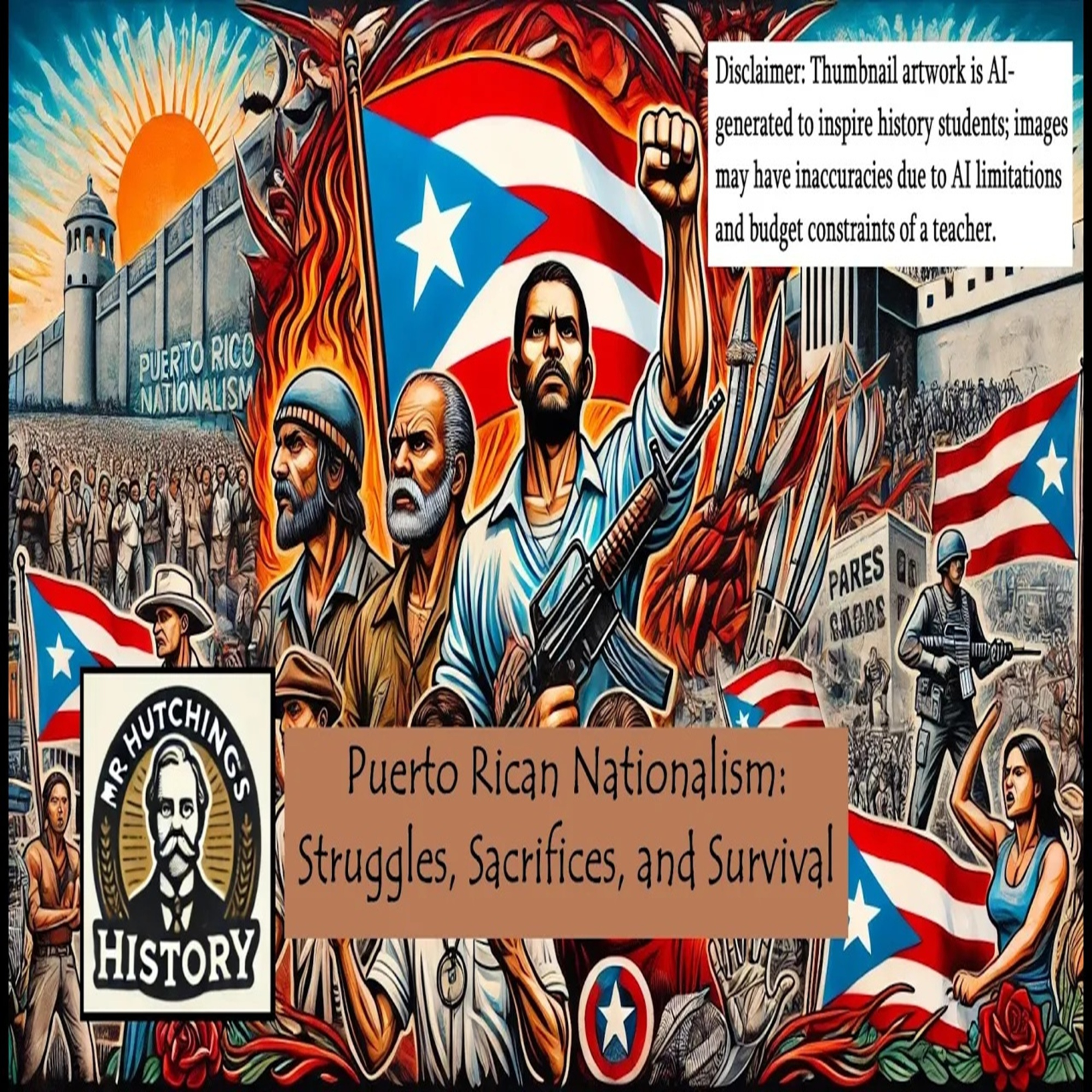 Mr. Hutchings HistoryPuerto Rican Nationalism: Struggles, Sacrifices, and SurvivalIn this episode of Mr. Hutchings History, we explore the intense and often controversial history of Puerto Rican nationalism, from acts of defiance in the 1950s to the enduring struggles of Puerto Ricans on the U.S. mainland. We examine the complex relationship between Puerto Rico and the U.S., beginning with its status as an unincorporated territory and the frustrations that led to the rise of the Puerto Rican Nationalist Party and groups like the Young Lords.
The episode covers pivotal events such as the 1950 assassination attempt on President Truman and the 1954 attack on the U...2024-12-0918 min
Mr. Hutchings HistoryPuerto Rican Nationalism: Struggles, Sacrifices, and SurvivalIn this episode of Mr. Hutchings History, we explore the intense and often controversial history of Puerto Rican nationalism, from acts of defiance in the 1950s to the enduring struggles of Puerto Ricans on the U.S. mainland. We examine the complex relationship between Puerto Rico and the U.S., beginning with its status as an unincorporated territory and the frustrations that led to the rise of the Puerto Rican Nationalist Party and groups like the Young Lords.
The episode covers pivotal events such as the 1950 assassination attempt on President Truman and the 1954 attack on the U...2024-12-0918 min Mr. Hutchings HistoryAims of The Black Panther Party: Power, Pride, and Controversy in the Fight for JusticeIn this episode of Mr. Hutchings History, we explore the rise, aims, and legacy of the Black Panther Party for Self-Defense, founded in 1966 by Huey Newton and Bobby Seale. As a cornerstone of the Black Power Movement, the Panthers combined militant self-defense with community-focused programs to combat systemic racism and economic inequality.
Key Topics Covered:
The founding principles of the Black Panther Party and its Ten-Point Program.
The Party’s emphasis on self-defense, economic justice, and community empowerment.
Accomplishments such as the Free Breakfast for Children Program and health clinics.
The controversial perception of the Panthers as...2024-11-2214 min
Mr. Hutchings HistoryAims of The Black Panther Party: Power, Pride, and Controversy in the Fight for JusticeIn this episode of Mr. Hutchings History, we explore the rise, aims, and legacy of the Black Panther Party for Self-Defense, founded in 1966 by Huey Newton and Bobby Seale. As a cornerstone of the Black Power Movement, the Panthers combined militant self-defense with community-focused programs to combat systemic racism and economic inequality.
Key Topics Covered:
The founding principles of the Black Panther Party and its Ten-Point Program.
The Party’s emphasis on self-defense, economic justice, and community empowerment.
Accomplishments such as the Free Breakfast for Children Program and health clinics.
The controversial perception of the Panthers as...2024-11-2214 min Mr. Hutchings HistoryBlack Power and the Long Hot Summers, 1964-68: The Struggle for Ghetto JusticeWelcome to Mr. Hutchings History! In this episode, we explore the rise of Black Power amidst the turbulent “long hot summers” of urban unrest (1964-68). Sparked by systemic injustices such as police brutality, poverty, and housing inequities, riots erupted in cities like Watts, Newark, and Detroit. These uprisings underscored the deep frustrations of Black Americans and set the stage for Black Power’s emergence as a powerful voice for change.
Key Topics Covered:
The roots of ghetto unrest and the findings of the Kerner Commission, which warned of a racially divided America.
Why Black Power resonated deeply...2024-11-2217 min
Mr. Hutchings HistoryBlack Power and the Long Hot Summers, 1964-68: The Struggle for Ghetto JusticeWelcome to Mr. Hutchings History! In this episode, we explore the rise of Black Power amidst the turbulent “long hot summers” of urban unrest (1964-68). Sparked by systemic injustices such as police brutality, poverty, and housing inequities, riots erupted in cities like Watts, Newark, and Detroit. These uprisings underscored the deep frustrations of Black Americans and set the stage for Black Power’s emergence as a powerful voice for change.
Key Topics Covered:
The roots of ghetto unrest and the findings of the Kerner Commission, which warned of a racially divided America.
Why Black Power resonated deeply...2024-11-2217 min Mr. Hutchings HistoryThe Emergence of Black Power: Origins and Impact in the 1960sWelcome to Mr. Hutchings History! In this episode, we examine the rise of the Black Power movement during the transformative 1960s. Rooted in frustrations with the limitations of nonviolent civil rights strategies, Black Power called for racial pride, self-determination, and economic independence.
Key Discussion Points:
Origins: Influenced by Malcolm X and shaped by urban discontent and Southern activism, Black Power emerged as a powerful alternative to integration-focused strategies.
Defining Black Power: Stokely Carmichael’s 1966 rallying cry introduced core principles such as cultural pride, economic self-reliance, and community control.
Achievements: From the iconic Black Panther Party to th...2024-11-2214 min
Mr. Hutchings HistoryThe Emergence of Black Power: Origins and Impact in the 1960sWelcome to Mr. Hutchings History! In this episode, we examine the rise of the Black Power movement during the transformative 1960s. Rooted in frustrations with the limitations of nonviolent civil rights strategies, Black Power called for racial pride, self-determination, and economic independence.
Key Discussion Points:
Origins: Influenced by Malcolm X and shaped by urban discontent and Southern activism, Black Power emerged as a powerful alternative to integration-focused strategies.
Defining Black Power: Stokely Carmichael’s 1966 rallying cry introduced core principles such as cultural pride, economic self-reliance, and community control.
Achievements: From the iconic Black Panther Party to th...2024-11-2214 min Mr. Hutchings HistoryMalcolm X: The Aims, Methods, and Legacy of a Polarizing Civil Rights IconWelcome back to Mr. Hutchings History! In this episode, we dive deep into the life, philosophy, and enduring legacy of Malcolm X, one of the most controversial and influential figures of the Civil Rights Movement. Renowned for his unapologetic stance on Black nationalism, self-reliance, and self-defense, Malcolm X’s approach challenged the mainstream integrationist strategies of leaders like Martin Luther King Jr.
Key Topics:
Malcolm X’s aims to uplift Black communities through cultural pride, economic independence, and self-determination.
His provocative methods, including radical rhetoric and advocacy for self-defense, which resonated with urban Black Americans frustrated by s...2024-11-2213 min
Mr. Hutchings HistoryMalcolm X: The Aims, Methods, and Legacy of a Polarizing Civil Rights IconWelcome back to Mr. Hutchings History! In this episode, we dive deep into the life, philosophy, and enduring legacy of Malcolm X, one of the most controversial and influential figures of the Civil Rights Movement. Renowned for his unapologetic stance on Black nationalism, self-reliance, and self-defense, Malcolm X’s approach challenged the mainstream integrationist strategies of leaders like Martin Luther King Jr.
Key Topics:
Malcolm X’s aims to uplift Black communities through cultural pride, economic independence, and self-determination.
His provocative methods, including radical rhetoric and advocacy for self-defense, which resonated with urban Black Americans frustrated by s...2024-11-2213 min Mr. Hutchings HistoryDid Martin Make the Movement? Exploring Leadership in the Civil Rights MovementWelcome to Mr. Hutchings History! In this episode, we tackle one of the biggest debates in Civil Rights historiography: Was Martin Luther King Jr. the driving force of the movement, or was he shaped by the grassroots activism already in motion?
Key Discussion Points:
Top-Down vs. Bottom-Up Forces: Explore how King’s leadership, Supreme Court rulings, and federal legislation intersected with grassroots activism to propel the movement.
King’s Rise to Prominence: From the Montgomery Bus Boycott to the March on Washington, examine King’s role as a unifying symbol and his contributions to landmark victories like t...2024-11-2219 min
Mr. Hutchings HistoryDid Martin Make the Movement? Exploring Leadership in the Civil Rights MovementWelcome to Mr. Hutchings History! In this episode, we tackle one of the biggest debates in Civil Rights historiography: Was Martin Luther King Jr. the driving force of the movement, or was he shaped by the grassroots activism already in motion?
Key Discussion Points:
Top-Down vs. Bottom-Up Forces: Explore how King’s leadership, Supreme Court rulings, and federal legislation intersected with grassroots activism to propel the movement.
King’s Rise to Prominence: From the Montgomery Bus Boycott to the March on Washington, examine King’s role as a unifying symbol and his contributions to landmark victories like t...2024-11-2219 min Mr. Hutchings HistoryMartin Luther King Jr.: Successes, Setbacks, and Shifting Strategies in the Civil Rights MovementWelcome to Mr. Hutchings History! In this episode, we explore the remarkable yet complex legacy of Dr. Martin Luther King Jr., a leader whose vision and strategies evolved to address the dynamic challenges of the Civil Rights Movement.
Key Highlights:
Transformative Achievements: From the Montgomery Bus Boycott to the March on Washington, King’s nonviolent approach inspired nationwide support and led to historic victories, including the Civil Rights Act (1964) and the Voting Rights Act (1965).
Strategic Setbacks: Analyze lessons from Albany, St. Augustine, and Chicago, where King’s methods faced limitations against nonviolent resistance and de facto segr...2024-11-2212 min
Mr. Hutchings HistoryMartin Luther King Jr.: Successes, Setbacks, and Shifting Strategies in the Civil Rights MovementWelcome to Mr. Hutchings History! In this episode, we explore the remarkable yet complex legacy of Dr. Martin Luther King Jr., a leader whose vision and strategies evolved to address the dynamic challenges of the Civil Rights Movement.
Key Highlights:
Transformative Achievements: From the Montgomery Bus Boycott to the March on Washington, King’s nonviolent approach inspired nationwide support and led to historic victories, including the Civil Rights Act (1964) and the Voting Rights Act (1965).
Strategic Setbacks: Analyze lessons from Albany, St. Augustine, and Chicago, where King’s methods faced limitations against nonviolent resistance and de facto segr...2024-11-2212 min Mr. Hutchings HistoryCrossroads of the Movement: The 1966 Meredith March and the Rise of Black PowerIn this episode of Mr. Hutchings History, we explore the pivotal 1966 Meredith March, a moment that exposed deep ideological divisions within the Civil Rights Movement. Initiated by James Meredith to promote Black voter registration, the march became a platform for debate between Martin Luther King Jr.’s nonviolent integrationist philosophy and Stokely Carmichael’s rising call for Black Power.
Key Topics Discussed:
James Meredith’s journey from Memphis to Jackson and the shocking act of violence that galvanized civil rights leaders to join the march.
Ideological clashes between King’s Southern Christian Leadership Conference (SCLC) and Carmicha...2024-11-2212 min
Mr. Hutchings HistoryCrossroads of the Movement: The 1966 Meredith March and the Rise of Black PowerIn this episode of Mr. Hutchings History, we explore the pivotal 1966 Meredith March, a moment that exposed deep ideological divisions within the Civil Rights Movement. Initiated by James Meredith to promote Black voter registration, the march became a platform for debate between Martin Luther King Jr.’s nonviolent integrationist philosophy and Stokely Carmichael’s rising call for Black Power.
Key Topics Discussed:
James Meredith’s journey from Memphis to Jackson and the shocking act of violence that galvanized civil rights leaders to join the march.
Ideological clashes between King’s Southern Christian Leadership Conference (SCLC) and Carmicha...2024-11-2212 min Mr. Hutchings HistoryA Walk for Freedom or Power? The 1966 Meredith March and Divisions in the Civil Rights Movement at the University of MississippiIn this episode of Mr. Hutchings History, we analyze the 1966 Meredith March, a pivotal event that exposed deep ideological divisions within the Civil Rights Movement. What began as James Meredith’s solitary march for voting rights evolved into a stage for conflicting philosophies: Martin Luther King Jr.’s nonviolent approach versus Stokely Carmichael’s emerging call for “Black Power.”
Key Discussion Points:
The context of James Meredith’s symbolic journey from Memphis to Jackson, Mississippi, and the violent attack that galvanized civil rights groups to continue his mission.
Tensions between civil rights organizations, including SCLC, SNCC, and CORE, hi...2024-11-2215 min
Mr. Hutchings HistoryA Walk for Freedom or Power? The 1966 Meredith March and Divisions in the Civil Rights Movement at the University of MississippiIn this episode of Mr. Hutchings History, we analyze the 1966 Meredith March, a pivotal event that exposed deep ideological divisions within the Civil Rights Movement. What began as James Meredith’s solitary march for voting rights evolved into a stage for conflicting philosophies: Martin Luther King Jr.’s nonviolent approach versus Stokely Carmichael’s emerging call for “Black Power.”
Key Discussion Points:
The context of James Meredith’s symbolic journey from Memphis to Jackson, Mississippi, and the violent attack that galvanized civil rights groups to continue his mission.
Tensions between civil rights organizations, including SCLC, SNCC, and CORE, hi...2024-11-2215 min Mr. Hutchings HistoryMartin Luther King Jr., Malcolm X, and the Rise of Black PowerJoin Mr. Hutchings History as we explore the dynamic figures and philosophies that shaped the Civil Rights Movement. This episode focuses on the role of Martin Luther King Jr., contrasting his philosophy of nonviolence with Malcolm X’s call for Black self-determination and the emergence of the Black Power movement. Together, these leaders and ideologies transformed the fight for racial justice.
Key topics include:
Martin Luther King Jr.’s leadership in achieving legislative victories like the Civil Rights Act (1964) and Voting Rights Act (1965).
King’s shift toward economic justice in his later years and the challenges he fac...2024-11-2215 min
Mr. Hutchings HistoryMartin Luther King Jr., Malcolm X, and the Rise of Black PowerJoin Mr. Hutchings History as we explore the dynamic figures and philosophies that shaped the Civil Rights Movement. This episode focuses on the role of Martin Luther King Jr., contrasting his philosophy of nonviolence with Malcolm X’s call for Black self-determination and the emergence of the Black Power movement. Together, these leaders and ideologies transformed the fight for racial justice.
Key topics include:
Martin Luther King Jr.’s leadership in achieving legislative victories like the Civil Rights Act (1964) and Voting Rights Act (1965).
King’s shift toward economic justice in his later years and the challenges he fac...2024-11-2215 min Mr. Hutchings HistoryAfrican Americans and the Civil Rights Movement: A Journey to JusticeIn this episode of Mr. Hutchings History, we delve into the transformative journey of the Civil Rights Movement in the United States, exploring its milestones, key figures, and enduring legacy. From the abolition of slavery to landmark legislation like the Civil Rights Act of 1964 and the Voting Rights Act of 1965, this episode highlights the movement’s successes and limitations in dismantling systemic racial oppression.
Key topics include:
The legacy of slavery, Reconstruction, and the Jim Crow era.
The NAACP’s legal battles, culminating in Brown v. Board of Education.
Grassroots activism like the Montgomery Bus Boycott, Free...2024-11-2224 min
Mr. Hutchings HistoryAfrican Americans and the Civil Rights Movement: A Journey to JusticeIn this episode of Mr. Hutchings History, we delve into the transformative journey of the Civil Rights Movement in the United States, exploring its milestones, key figures, and enduring legacy. From the abolition of slavery to landmark legislation like the Civil Rights Act of 1964 and the Voting Rights Act of 1965, this episode highlights the movement’s successes and limitations in dismantling systemic racial oppression.
Key topics include:
The legacy of slavery, Reconstruction, and the Jim Crow era.
The NAACP’s legal battles, culminating in Brown v. Board of Education.
Grassroots activism like the Montgomery Bus Boycott, Free...2024-11-2224 min Mr. Hutchings HistoryThe South Transformed? Racial Progress and Continuing Challenges, 1966-1980In this episode of Mr. Hutchings History, we examine the transformation of the American South between 1966 and 1980, a period of significant civil rights advancements and persistent challenges. From school desegregation and increased Black political representation to the rise of the Black middle class, this era saw tangible progress driven by legislative milestones like the Civil Rights Act and Voting Rights Act. However, economic disparities, de facto segregation, and systemic inequalities persisted, revealing the limitations of these reforms.
Key topics include:
The dramatic reduction in school segregation and rising Black educational attainment.
Federal affirmative action policies that...2024-11-2216 min
Mr. Hutchings HistoryThe South Transformed? Racial Progress and Continuing Challenges, 1966-1980In this episode of Mr. Hutchings History, we examine the transformation of the American South between 1966 and 1980, a period of significant civil rights advancements and persistent challenges. From school desegregation and increased Black political representation to the rise of the Black middle class, this era saw tangible progress driven by legislative milestones like the Civil Rights Act and Voting Rights Act. However, economic disparities, de facto segregation, and systemic inequalities persisted, revealing the limitations of these reforms.
Key topics include:
The dramatic reduction in school segregation and rising Black educational attainment.
Federal affirmative action policies that...2024-11-2216 min Mr. Hutchings HistoryLyndon B. Johnson's Legislative Revolution: Civil Rights, Education, and Social Welfare, 1964-65In this episode of Mr. Hutchings History, we explore President Lyndon B. Johnson's legislative revolution during 1964-65, a transformative period in American history. With the passage of landmark laws such as the Civil Rights Act, Voting Rights Act, and groundbreaking education and healthcare reforms, Johnson’s “Great Society” aimed to dismantle systemic racial injustice, expand educational opportunities, and reduce poverty.
Discover how Johnson’s congressional expertise, the national sentiment following JFK’s assassination, and grassroots civil rights activism created a unique moment for sweeping reform. We examine the immediate impacts of these laws, from the end of de jure se...2024-11-2216 min
Mr. Hutchings HistoryLyndon B. Johnson's Legislative Revolution: Civil Rights, Education, and Social Welfare, 1964-65In this episode of Mr. Hutchings History, we explore President Lyndon B. Johnson's legislative revolution during 1964-65, a transformative period in American history. With the passage of landmark laws such as the Civil Rights Act, Voting Rights Act, and groundbreaking education and healthcare reforms, Johnson’s “Great Society” aimed to dismantle systemic racial injustice, expand educational opportunities, and reduce poverty.
Discover how Johnson’s congressional expertise, the national sentiment following JFK’s assassination, and grassroots civil rights activism created a unique moment for sweeping reform. We examine the immediate impacts of these laws, from the end of de jure se...2024-11-2216 min Mr. Hutchings HistoryThe Voting Rights Act of 1965: Transforming Democracy in the SouthIn this episode of Mr. Hutchings History, we examine the transformative impact of the Voting Rights Act of 1965, a milestone in the Civil Rights Movement that dismantled discriminatory practices like literacy tests and poll taxes. The Act empowered millions of Black Americans, reshaping the political landscape of the South and advancing the ideals of democracy.
We explore the Act's origins, driven by grassroots activism and national outrage following “Bloody Sunday” in Selma. Discover how President Lyndon B. Johnson’s leadership and public outcry accelerated its passage and examine the immediate effects, from surging Black voter registration to the ri...2024-11-2210 min
Mr. Hutchings HistoryThe Voting Rights Act of 1965: Transforming Democracy in the SouthIn this episode of Mr. Hutchings History, we examine the transformative impact of the Voting Rights Act of 1965, a milestone in the Civil Rights Movement that dismantled discriminatory practices like literacy tests and poll taxes. The Act empowered millions of Black Americans, reshaping the political landscape of the South and advancing the ideals of democracy.
We explore the Act's origins, driven by grassroots activism and national outrage following “Bloody Sunday” in Selma. Discover how President Lyndon B. Johnson’s leadership and public outcry accelerated its passage and examine the immediate effects, from surging Black voter registration to the ri...2024-11-2210 min Mr. Hutchings HistorySelma 1965: The Movement's Finest Hour and the Fractures BeneathJoin Mr. Hutchings History as we explore the 1965 Selma campaign, a pivotal moment in the Civil Rights Movement. Known as “the movement’s finest hour,” Selma revealed both the power of collective action and the growing fractures within the movement. This episode delves into the events of “Bloody Sunday,” the national reaction that spurred the Voting Rights Act of 1965, and the tensions between the Southern Christian Leadership Conference (SCLC) and the Student Nonviolent Coordinating Committee (SNCC).
Learn about the brutality of Selma’s opposition, the symbolic leadership of Dr. Martin Luther King Jr., and the grassroots efforts that made Se...2024-11-2216 min
Mr. Hutchings HistorySelma 1965: The Movement's Finest Hour and the Fractures BeneathJoin Mr. Hutchings History as we explore the 1965 Selma campaign, a pivotal moment in the Civil Rights Movement. Known as “the movement’s finest hour,” Selma revealed both the power of collective action and the growing fractures within the movement. This episode delves into the events of “Bloody Sunday,” the national reaction that spurred the Voting Rights Act of 1965, and the tensions between the Southern Christian Leadership Conference (SCLC) and the Student Nonviolent Coordinating Committee (SNCC).
Learn about the brutality of Selma’s opposition, the symbolic leadership of Dr. Martin Luther King Jr., and the grassroots efforts that made Se...2024-11-2216 min Mr. Hutchings HistoryThe 1965 Selma Campaign and “Bloody Sunday”: The Fight for Voting RightsJoin Mr. Hutchings History as we explore the Selma campaign of 1965, a defining chapter in the Civil Rights Movement. This episode examines the systemic resistance to Black suffrage in the South and the strategic fight for voting rights, culminating in the infamous events of “Bloody Sunday” on the Edmund Pettus Bridge. Learn how the courage of activists, the brutal response of authorities, and the resulting national outrage led to the landmark Voting Rights Act of 1965.
We’ll analyze the role of Dr. Martin Luther King Jr. and the Southern Christian Leadership Conference (SCLC), as well as the contri...2024-11-2214 min
Mr. Hutchings HistoryThe 1965 Selma Campaign and “Bloody Sunday”: The Fight for Voting RightsJoin Mr. Hutchings History as we explore the Selma campaign of 1965, a defining chapter in the Civil Rights Movement. This episode examines the systemic resistance to Black suffrage in the South and the strategic fight for voting rights, culminating in the infamous events of “Bloody Sunday” on the Edmund Pettus Bridge. Learn how the courage of activists, the brutal response of authorities, and the resulting national outrage led to the landmark Voting Rights Act of 1965.
We’ll analyze the role of Dr. Martin Luther King Jr. and the Southern Christian Leadership Conference (SCLC), as well as the contri...2024-11-2214 min Mr. Hutchings HistoryThe Impact and Limits of the Civil Rights Act of 1964Explore the landmark Civil Rights Act of 1964 and its profound influence on the fight for racial equality in this episode of Mr. Hutchings History. This transformative legislation ended de jure segregation, prohibited discrimination in public spaces and employment, and established the Equal Employment Opportunity Commission (EEOC). Despite these achievements, the Act faced limitations, particularly in addressing systemic inequality and voting rights, which remained key barriers for Black Americans.
We’ll analyze its strengths, shortcomings, and the political dynamics surrounding its passage under Lyndon B. Johnson’s leadership. Dive into the reactions from civil rights activists, the Black comm...2024-11-2214 min
Mr. Hutchings HistoryThe Impact and Limits of the Civil Rights Act of 1964Explore the landmark Civil Rights Act of 1964 and its profound influence on the fight for racial equality in this episode of Mr. Hutchings History. This transformative legislation ended de jure segregation, prohibited discrimination in public spaces and employment, and established the Equal Employment Opportunity Commission (EEOC). Despite these achievements, the Act faced limitations, particularly in addressing systemic inequality and voting rights, which remained key barriers for Black Americans.
We’ll analyze its strengths, shortcomings, and the political dynamics surrounding its passage under Lyndon B. Johnson’s leadership. Dive into the reactions from civil rights activists, the Black comm...2024-11-2214 min Mr. Hutchings HistoryThe Civil Rights Act of 1964: Lyndon B. Johnson’s Legacy and the Path to EqualityDive into the transformative passage of the Civil Rights Act of 1964 in this episode of Mr. Hutchings History. This landmark legislation ended legal segregation and prohibited discrimination based on race, color, religion, sex, or national origin. We explore the roles of key figures like Lyndon B. Johnson, the political and social dynamics behind the bill, and the relentless activism that paved the way for its success.
Discover the challenges Johnson faced in Congress, the influence of grassroots movements, and the impact of events like the Birmingham Campaign and the March on Washington. Learn about the historiographical perspectives...2024-11-2210 min
Mr. Hutchings HistoryThe Civil Rights Act of 1964: Lyndon B. Johnson’s Legacy and the Path to EqualityDive into the transformative passage of the Civil Rights Act of 1964 in this episode of Mr. Hutchings History. This landmark legislation ended legal segregation and prohibited discrimination based on race, color, religion, sex, or national origin. We explore the roles of key figures like Lyndon B. Johnson, the political and social dynamics behind the bill, and the relentless activism that paved the way for its success.
Discover the challenges Johnson faced in Congress, the influence of grassroots movements, and the impact of events like the Birmingham Campaign and the March on Washington. Learn about the historiographical perspectives...2024-11-2210 min Mr. Hutchings HistorySNCC in Mississippi: Empowering Communities and Challenging the SystemWorks Cited
Carson, Clayborne. In Struggle: SNCC and the Black Awakening of the 1960s. Harvard UP, 1981.
Fairclough, Adam. Better Day Coming: Blacks and Equality, 1890-2000. Penguin, 2001.
Garrow, David J. Bearing the Cross: Martin Luther King Jr. and the Southern Christian Leadership Conference. William Morrow, 1986.
Payne, Charles M. I’ve Got the Light of Freedom: The Organizing Tradition and the Mississippi Freedom Struggle. University of California Press, 1995.2024-11-2222 min
Mr. Hutchings HistorySNCC in Mississippi: Empowering Communities and Challenging the SystemWorks Cited
Carson, Clayborne. In Struggle: SNCC and the Black Awakening of the 1960s. Harvard UP, 1981.
Fairclough, Adam. Better Day Coming: Blacks and Equality, 1890-2000. Penguin, 2001.
Garrow, David J. Bearing the Cross: Martin Luther King Jr. and the Southern Christian Leadership Conference. William Morrow, 1986.
Payne, Charles M. I’ve Got the Light of Freedom: The Organizing Tradition and the Mississippi Freedom Struggle. University of California Press, 1995.2024-11-2222 min Mr. Hutchings HistorySNCC and the Fight for Freedom in MississippiJoin Mr. Hutchings History as we explore the Student Nonviolent Coordinating Committee’s (SNCC) pivotal work in Mississippi during the Civil Rights Movement. Known as the “Black Freedom Movement in Mississippi,” SNCC’s grassroots organizing, including the 1964 Freedom Summer and the creation of the Mississippi Freedom Democratic Party (MFDP), challenged the systemic racism and disenfranchisement deeply entrenched in the state.
This episode examines SNCC’s innovative tactics, the brutal resistance they faced, and their profound impact on the fight for voting rights and social justice. We’ll discuss the role of leaders like Bob Moses and Fannie Lou Hamer, t...2024-11-2214 min
Mr. Hutchings HistorySNCC and the Fight for Freedom in MississippiJoin Mr. Hutchings History as we explore the Student Nonviolent Coordinating Committee’s (SNCC) pivotal work in Mississippi during the Civil Rights Movement. Known as the “Black Freedom Movement in Mississippi,” SNCC’s grassroots organizing, including the 1964 Freedom Summer and the creation of the Mississippi Freedom Democratic Party (MFDP), challenged the systemic racism and disenfranchisement deeply entrenched in the state.
This episode examines SNCC’s innovative tactics, the brutal resistance they faced, and their profound impact on the fight for voting rights and social justice. We’ll discuss the role of leaders like Bob Moses and Fannie Lou Hamer, t...2024-11-2214 min Mr. Hutchings HistoryThe Legacy of the 1963 March on Washington: Unity, Dissent, and ProgressJoin Mr. Hutchings History as we examine the significance and complexities of the 1963 March on Washington for Jobs and Freedom. Held on August 28, 1963, this historic event brought together a diverse coalition of leaders, including Martin Luther King Jr., and over 250,000 participants in a powerful call for civil rights and economic justice. Best known for King’s iconic “I Have a Dream” speech, the march became a symbol of unity and hope while sparking debates about its impact and strategy.
In this episode, we explore the march’s planning, its immediate outcomes, and its legacy in shaping public opinion...2024-11-2214 min
Mr. Hutchings HistoryThe Legacy of the 1963 March on Washington: Unity, Dissent, and ProgressJoin Mr. Hutchings History as we examine the significance and complexities of the 1963 March on Washington for Jobs and Freedom. Held on August 28, 1963, this historic event brought together a diverse coalition of leaders, including Martin Luther King Jr., and over 250,000 participants in a powerful call for civil rights and economic justice. Best known for King’s iconic “I Have a Dream” speech, the march became a symbol of unity and hope while sparking debates about its impact and strategy.
In this episode, we explore the march’s planning, its immediate outcomes, and its legacy in shaping public opinion...2024-11-2214 min Mr. Hutchings HistoryThe 1963 March on Washington: A Dream of EqualityIn this episode of Mr. Hutchings History, we delve into the 1963 March on Washington for Jobs and Freedom, one of the most iconic events in American history. Held on August 28, 1963, this peaceful demonstration brought together civil rights, labor, and religious organizations to demand equality, economic justice, and the passage of the Civil Rights Act. The march culminated in Martin Luther King Jr.’s legendary “I Have a Dream” speech, which became a symbol of hope and the moral urgency of the Civil Rights Movement.
We’ll explore the march’s planning, its diverse coalition of leaders and participan...2024-11-2214 min
Mr. Hutchings HistoryThe 1963 March on Washington: A Dream of EqualityIn this episode of Mr. Hutchings History, we delve into the 1963 March on Washington for Jobs and Freedom, one of the most iconic events in American history. Held on August 28, 1963, this peaceful demonstration brought together civil rights, labor, and religious organizations to demand equality, economic justice, and the passage of the Civil Rights Act. The march culminated in Martin Luther King Jr.’s legendary “I Have a Dream” speech, which became a symbol of hope and the moral urgency of the Civil Rights Movement.
We’ll explore the march’s planning, its diverse coalition of leaders and participan...2024-11-2214 min Mr. Hutchings HistoryThe Results and Significance of 1963 Birmingham: A Turning Point in Civil RightsIn this episode of Mr. Hutchings History, we examine the results and enduring significance of the 1963 Birmingham Campaign. This watershed moment in the Civil Rights Movement, led by Martin Luther King Jr. and the Southern Christian Leadership Conference (SCLC), revealed the brutal realities of segregation and galvanized public support for racial equality. Through strategic nonviolent protests, media coverage, and the use of the Children’s Crusade, the campaign forced national attention on the moral crisis of segregation and influenced President Kennedy’s push for the Civil Rights Act of 1964.
We’ll analyze King’s tactics, the controversies surround...2024-11-2213 min
Mr. Hutchings HistoryThe Results and Significance of 1963 Birmingham: A Turning Point in Civil RightsIn this episode of Mr. Hutchings History, we examine the results and enduring significance of the 1963 Birmingham Campaign. This watershed moment in the Civil Rights Movement, led by Martin Luther King Jr. and the Southern Christian Leadership Conference (SCLC), revealed the brutal realities of segregation and galvanized public support for racial equality. Through strategic nonviolent protests, media coverage, and the use of the Children’s Crusade, the campaign forced national attention on the moral crisis of segregation and influenced President Kennedy’s push for the Civil Rights Act of 1964.
We’ll analyze King’s tactics, the controversies surround...2024-11-2213 min Mr. Hutchings HistoryThe 1963 Birmingham Campaign: Exposing Injustice, Forcing ChangeIn this episode of Mr. Hutchings History, we examine the pivotal 1963 Birmingham Campaign, a transformative moment in the Civil Rights Movement. Orchestrated by Martin Luther King Jr. and the Southern Christian Leadership Conference (SCLC), this campaign exposed the brutality of segregation in Birmingham, Alabama, and compelled federal action. From the strategic decision to target Birmingham to King’s iconic “Letter from Birmingham Jail” and the powerful images of the Children’s Crusade, we explore how this campaign galvanized public opinion and influenced the Kennedy administration’s push for civil rights legislation. Historians debate Birmingham’s significance, examining its grassroots support, str...2024-11-2219 min
Mr. Hutchings HistoryThe 1963 Birmingham Campaign: Exposing Injustice, Forcing ChangeIn this episode of Mr. Hutchings History, we examine the pivotal 1963 Birmingham Campaign, a transformative moment in the Civil Rights Movement. Orchestrated by Martin Luther King Jr. and the Southern Christian Leadership Conference (SCLC), this campaign exposed the brutality of segregation in Birmingham, Alabama, and compelled federal action. From the strategic decision to target Birmingham to King’s iconic “Letter from Birmingham Jail” and the powerful images of the Children’s Crusade, we explore how this campaign galvanized public opinion and influenced the Kennedy administration’s push for civil rights legislation. Historians debate Birmingham’s significance, examining its grassroots support, str...2024-11-2219 min Mr. Hutchings HistoryThe 1961-62 Albany Movement: A “Failed” Campaign and Lessons LearnedIn this episode of Mr. Hutchings History, we analyze the Albany Movement—a civil rights campaign often labeled a “failure.” Despite its inability to achieve immediate desegregation, Albany offered critical lessons that shaped future successes, such as the Birmingham Campaign. We explore the movement’s broad goals, the calculated strategy of police chief Laurie Pritchett, internal tensions among civil rights groups, and Martin Luther King Jr.’s reflections on the campaign. Historians offer diverse perspectives on Albany’s significance, from its grassroots empowerment to its strategic missteps. Join us as we unpack how setbacks in Albany helped refine the Civil Rights...2024-11-2221 min
Mr. Hutchings HistoryThe 1961-62 Albany Movement: A “Failed” Campaign and Lessons LearnedIn this episode of Mr. Hutchings History, we analyze the Albany Movement—a civil rights campaign often labeled a “failure.” Despite its inability to achieve immediate desegregation, Albany offered critical lessons that shaped future successes, such as the Birmingham Campaign. We explore the movement’s broad goals, the calculated strategy of police chief Laurie Pritchett, internal tensions among civil rights groups, and Martin Luther King Jr.’s reflections on the campaign. Historians offer diverse perspectives on Albany’s significance, from its grassroots empowerment to its strategic missteps. Join us as we unpack how setbacks in Albany helped refine the Civil Rights...2024-11-2221 min Mr. Hutchings HistoryThe Albany Movement 1961-62: Local Challenges and the Limits of Nonviolent ProtestIn this episode of Mr. Hutchings History, we examine the Albany Movement, a pivotal yet complex campaign in the Civil Rights Movement. Initiated by SNCC in 1961 to challenge segregation in Albany, Georgia, the movement faced strategic setbacks due to the nonviolent resistance of police chief Laurie Pritchett and internal tensions among civil rights groups. Despite its inability to achieve immediate desegregation, Albany provided critical lessons that shaped future successes, like the Birmingham Campaign. Explore the movement’s grassroots origins, Martin Luther King Jr.'s involvement, and the historiographical debates over Albany’s legacy.
#Paper3HLoption2 #HistoryoftheAmericas #CivilRightsMovement #Alba...2024-11-2214 min
Mr. Hutchings HistoryThe Albany Movement 1961-62: Local Challenges and the Limits of Nonviolent ProtestIn this episode of Mr. Hutchings History, we examine the Albany Movement, a pivotal yet complex campaign in the Civil Rights Movement. Initiated by SNCC in 1961 to challenge segregation in Albany, Georgia, the movement faced strategic setbacks due to the nonviolent resistance of police chief Laurie Pritchett and internal tensions among civil rights groups. Despite its inability to achieve immediate desegregation, Albany provided critical lessons that shaped future successes, like the Birmingham Campaign. Explore the movement’s grassroots origins, Martin Luther King Jr.'s involvement, and the historiographical debates over Albany’s legacy.
#Paper3HLoption2 #HistoryoftheAmericas #CivilRightsMovement #Alba...2024-11-2214 min Mr. Hutchings HistoryThe 1960 Sit-Ins and the Birth of SNCC: Youth, Direct Action, and a New Civil Rights MovementIn this episode of Mr. Hutchings History, we explore the transformative year of 1960, when the Greensboro sit-ins and the formation of the Student Nonviolent Coordinating Committee (SNCC) revolutionized civil rights activism. Sparked by four Black college students in Greensboro, North Carolina, the sit-ins inspired a wave of youth-led protests across the South, shifting the Civil Rights Movement toward grassroots activism and direct action. Learn how SNCC’s decentralized, community-driven approach challenged the strategies of established groups like the NAACP and SCLC, empowering a new generation of leaders to confront segregation head-on.
#Paper3HLoption2 #HistoryoftheAmericas #CivilRightsMovement #SNCC #GreensboroSitIns #Yo...2024-11-2226 min
Mr. Hutchings HistoryThe 1960 Sit-Ins and the Birth of SNCC: Youth, Direct Action, and a New Civil Rights MovementIn this episode of Mr. Hutchings History, we explore the transformative year of 1960, when the Greensboro sit-ins and the formation of the Student Nonviolent Coordinating Committee (SNCC) revolutionized civil rights activism. Sparked by four Black college students in Greensboro, North Carolina, the sit-ins inspired a wave of youth-led protests across the South, shifting the Civil Rights Movement toward grassroots activism and direct action. Learn how SNCC’s decentralized, community-driven approach challenged the strategies of established groups like the NAACP and SCLC, empowering a new generation of leaders to confront segregation head-on.
#Paper3HLoption2 #HistoryoftheAmericas #CivilRightsMovement #SNCC #GreensboroSitIns #Yo...2024-11-2226 min Mr. Hutchings HistoryThe Southern Christian Leadership Conference (SCLC) 1957-1960: Church, Leadership, and Early ChallengesIn this episode of Mr. Hutchings History, we explore the formative years of the Southern Christian Leadership Conference (SCLC), founded in 1957 by Martin Luther King Jr. and other Black ministers. Discover how this church-centered organization introduced nonviolent direct action as a cornerstone strategy in the Civil Rights Movement, despite early financial and organizational struggles. We’ll examine the SCLC’s roots in the Montgomery Bus Boycott, its tensions with the NAACP, and the rise of SNCC’s grassroots approach. Learn how the SCLC’s emphasis on mass demonstrations and public mobilization laid the groundwork for transformative campaigns in the 1960s.
2024-11-2215 min
Mr. Hutchings HistoryThe Southern Christian Leadership Conference (SCLC) 1957-1960: Church, Leadership, and Early ChallengesIn this episode of Mr. Hutchings History, we explore the formative years of the Southern Christian Leadership Conference (SCLC), founded in 1957 by Martin Luther King Jr. and other Black ministers. Discover how this church-centered organization introduced nonviolent direct action as a cornerstone strategy in the Civil Rights Movement, despite early financial and organizational struggles. We’ll examine the SCLC’s roots in the Montgomery Bus Boycott, its tensions with the NAACP, and the rise of SNCC’s grassroots approach. Learn how the SCLC’s emphasis on mass demonstrations and public mobilization laid the groundwork for transformative campaigns in the 1960s.
2024-11-2215 min Mr. Hutchings HistoryNew Civil Rights Organizations: Expanding Tactics Beyond the CourtsIn this episode of Mr. Hutchings History, we explore the evolution of civil rights strategies after the Montgomery Bus Boycott. Moving beyond courtroom battles led by the NAACP, organizations like the Southern Christian Leadership Conference (SCLC), the Student Nonviolent Coordinating Committee (SNCC), and the Congress of Racial Equality (CORE) adopted direct action, grassroots organizing, and nonviolent protest. From the Birmingham Campaign and Freedom Rides to SNCC’s voter registration efforts, these groups transformed the Civil Rights Movement by engaging communities, challenging segregation in public spaces, and demanding federal intervention. Discover how these tactics reshaped the fight for equality and in...2024-11-2213 min
Mr. Hutchings HistoryNew Civil Rights Organizations: Expanding Tactics Beyond the CourtsIn this episode of Mr. Hutchings History, we explore the evolution of civil rights strategies after the Montgomery Bus Boycott. Moving beyond courtroom battles led by the NAACP, organizations like the Southern Christian Leadership Conference (SCLC), the Student Nonviolent Coordinating Committee (SNCC), and the Congress of Racial Equality (CORE) adopted direct action, grassroots organizing, and nonviolent protest. From the Birmingham Campaign and Freedom Rides to SNCC’s voter registration efforts, these groups transformed the Civil Rights Movement by engaging communities, challenging segregation in public spaces, and demanding federal intervention. Discover how these tactics reshaped the fight for equality and in...2024-11-2213 min Mr. Hutchings HistoryThe Significance of Little Rock: Lessons and LegacyIn this episode of Mr. Hutchings History, we analyze the aftermath of the 1957 Little Rock Crisis, a defining event in the Civil Rights Movement. Discover how the bravery of the Little Rock Nine exposed the limits of Supreme Court rulings like Brown v. Board of Education and revealed the challenges of enforcing desegregation in the South. Learn about Governor Orval Faubus’s political maneuvering, President Eisenhower’s reluctant federal intervention, and the lasting impact of media coverage. We’ll also explore the Supreme Court’s response in Cooper v. Aaron and discuss how Little Rock shaped civil rights strategies, emphasiz...2024-11-2210 min
Mr. Hutchings HistoryThe Significance of Little Rock: Lessons and LegacyIn this episode of Mr. Hutchings History, we analyze the aftermath of the 1957 Little Rock Crisis, a defining event in the Civil Rights Movement. Discover how the bravery of the Little Rock Nine exposed the limits of Supreme Court rulings like Brown v. Board of Education and revealed the challenges of enforcing desegregation in the South. Learn about Governor Orval Faubus’s political maneuvering, President Eisenhower’s reluctant federal intervention, and the lasting impact of media coverage. We’ll also explore the Supreme Court’s response in Cooper v. Aaron and discuss how Little Rock shaped civil rights strategies, emphasiz...2024-11-2210 min Mr. Hutchings HistoryThe Little Rock Crisis of 1957: Integration, Resistance, and Federal InterventionIn this episode of Mr. Hutchings History, we delve into the 1957 Little Rock Crisis, a pivotal moment in the Civil Rights Movement. Learn how the integration of Central High School by the courageous Little Rock Nine faced fierce resistance from Arkansas Governor Orval Faubus and violent mobs. Explore the NAACP’s role in enforcing the Supreme Court’s Brown v. Board of Education ruling, President Eisenhower’s federal intervention with the 101st Airborne Division, and the broader implications of this crisis on federal authority and the fight for civil rights.
#Paper3HLoption2 #HistoryoftheAmericas #CivilRightsMovement #LittleRockCrisis #LittleRockNine #BrownvBoard #NAACP...2024-11-2210 min
Mr. Hutchings HistoryThe Little Rock Crisis of 1957: Integration, Resistance, and Federal InterventionIn this episode of Mr. Hutchings History, we delve into the 1957 Little Rock Crisis, a pivotal moment in the Civil Rights Movement. Learn how the integration of Central High School by the courageous Little Rock Nine faced fierce resistance from Arkansas Governor Orval Faubus and violent mobs. Explore the NAACP’s role in enforcing the Supreme Court’s Brown v. Board of Education ruling, President Eisenhower’s federal intervention with the 101st Airborne Division, and the broader implications of this crisis on federal authority and the fight for civil rights.
#Paper3HLoption2 #HistoryoftheAmericas #CivilRightsMovement #LittleRockCrisis #LittleRockNine #BrownvBoard #NAACP...2024-11-2210 min Mr. Hutchings HistoryThe End of Segregation in the South: 1955-1965In this episode of Mr. Hutchings History, we delve into the critical decade that marked the end of legal segregation in the South. From the Civil Rights Act of 1964 to the Voting Rights Act of 1965, explore how grassroots activism, federal legislation, and the leadership of figures like Martin Luther King Jr. dismantled de jure segregation. Discover the roles of the NAACP, landmark court cases, nonviolent protests like the Birmingham Campaign, and key events such as the Selma marches. Learn how changing White opinion and media coverage played pivotal roles in this historic transformation.
#Paper3HLoption2 #HistoryoftheAmericas #CivilRightsMovement...2024-11-2222 min
Mr. Hutchings HistoryThe End of Segregation in the South: 1955-1965In this episode of Mr. Hutchings History, we delve into the critical decade that marked the end of legal segregation in the South. From the Civil Rights Act of 1964 to the Voting Rights Act of 1965, explore how grassroots activism, federal legislation, and the leadership of figures like Martin Luther King Jr. dismantled de jure segregation. Discover the roles of the NAACP, landmark court cases, nonviolent protests like the Birmingham Campaign, and key events such as the Selma marches. Learn how changing White opinion and media coverage played pivotal roles in this historic transformation.
#Paper3HLoption2 #HistoryoftheAmericas #CivilRightsMovement...2024-11-2222 min Mr. Hutchings HistoryWhen Did the Civil Rights Movement Begin? Unpacking the OriginsIn this episode of Mr. Hutchings History, we explore the debated origins of the Civil Rights Movement. Was it the 1950s with events like Brown v. Board of Education and the Montgomery Bus Boycott? Or do its roots stretch back to the New Deal, World War II, and early activism by organizations like the NAACP? We’ll examine how Black militancy during World War II, legal battles in the 1940s, and grassroots efforts in the 1930s laid the groundwork for the movement. Join us as we uncover the perspectives of historians, legal scholars, and activists to define the evolution of...2024-11-2216 min
Mr. Hutchings HistoryWhen Did the Civil Rights Movement Begin? Unpacking the OriginsIn this episode of Mr. Hutchings History, we explore the debated origins of the Civil Rights Movement. Was it the 1950s with events like Brown v. Board of Education and the Montgomery Bus Boycott? Or do its roots stretch back to the New Deal, World War II, and early activism by organizations like the NAACP? We’ll examine how Black militancy during World War II, legal battles in the 1940s, and grassroots efforts in the 1930s laid the groundwork for the movement. Join us as we uncover the perspectives of historians, legal scholars, and activists to define the evolution of...2024-11-2216 min Mr. Hutchings HistoryMartin Luther King Jr. and the New Negro: Controversies in 1955In this episode of Mr. Hutchings History, we dive into the early leadership of Martin Luther King Jr. during the Montgomery Bus Boycott and the debates surrounding his concept of the "New Negro." As King rose to prominence, his rhetoric of a more assertive, self-confident Black identity clashed with established civil rights leaders, like Roy Wilkins of the NAACP, who emphasized continuity with previous generations of struggle. We’ll explore the tensions within the movement, how King’s leadership influenced the course of the Civil Rights Movement, and how the concept of the “New Negro” became a defining idea for a ne...2024-11-2220 min
Mr. Hutchings HistoryMartin Luther King Jr. and the New Negro: Controversies in 1955In this episode of Mr. Hutchings History, we dive into the early leadership of Martin Luther King Jr. during the Montgomery Bus Boycott and the debates surrounding his concept of the "New Negro." As King rose to prominence, his rhetoric of a more assertive, self-confident Black identity clashed with established civil rights leaders, like Roy Wilkins of the NAACP, who emphasized continuity with previous generations of struggle. We’ll explore the tensions within the movement, how King’s leadership influenced the course of the Civil Rights Movement, and how the concept of the “New Negro” became a defining idea for a ne...2024-11-2220 min Mr. Hutchings HistoryThe Impact of the Montgomery Bus Boycott: Legacy, Lessons, and a New EraIn this episode of Mr. Hutchings History, we explore the lasting impact of the 1955-1956 Montgomery Bus Boycott, a pivotal event in the Civil Rights Movement. This boycott not only resulted in the desegregation of Montgomery’s buses but also showcased the power of community organization, economic leverage, and nonviolent protest. We’ll examine the role of Martin Luther King Jr. in rising to national prominence, the critical involvement of Black churches, and the unity within the Montgomery Black community that fueled the boycott’s success. We’ll also look at the legal victory in Browder v. Gayle and the broa...2024-11-2225 min
Mr. Hutchings HistoryThe Impact of the Montgomery Bus Boycott: Legacy, Lessons, and a New EraIn this episode of Mr. Hutchings History, we explore the lasting impact of the 1955-1956 Montgomery Bus Boycott, a pivotal event in the Civil Rights Movement. This boycott not only resulted in the desegregation of Montgomery’s buses but also showcased the power of community organization, economic leverage, and nonviolent protest. We’ll examine the role of Martin Luther King Jr. in rising to national prominence, the critical involvement of Black churches, and the unity within the Montgomery Black community that fueled the boycott’s success. We’ll also look at the legal victory in Browder v. Gayle and the broa...2024-11-2225 min Mr. Hutchings HistoryMartin Luther King Jr. and the Montgomery Improvement Association: A Leader for the Civil Rights MovementIn this episode of Mr. Hutchings History, we explore Martin Luther King Jr.'s pivotal role in the Montgomery Bus Boycott through his leadership of the Montgomery Improvement Association (MIA). King emerged as the face of the Civil Rights Movement, embodying the values of nonviolence and collective action. We discuss how King was chosen to lead the boycott, the unity and sacrifice of Montgomery's Black community, and the strategies that fueled their protest. King’s commitment to peaceful resistance helped galvanize the fight against segregation and set the tone for the broader Civil Rights Movement. We also examine the le...2024-11-2216 min
Mr. Hutchings HistoryMartin Luther King Jr. and the Montgomery Improvement Association: A Leader for the Civil Rights MovementIn this episode of Mr. Hutchings History, we explore Martin Luther King Jr.'s pivotal role in the Montgomery Bus Boycott through his leadership of the Montgomery Improvement Association (MIA). King emerged as the face of the Civil Rights Movement, embodying the values of nonviolence and collective action. We discuss how King was chosen to lead the boycott, the unity and sacrifice of Montgomery's Black community, and the strategies that fueled their protest. King’s commitment to peaceful resistance helped galvanize the fight against segregation and set the tone for the broader Civil Rights Movement. We also examine the le...2024-11-2216 min Mr. Hutchings HistoryThe 1955-56 Montgomery Bus Boycott: Spark of the Civil Rights MovementIn this episode of Mr. Hutchings History, we explore the pivotal Montgomery Bus Boycott of 1955-56, often regarded as the beginning of the modern Civil Rights Movement. This boycott, sparked by Rosa Parks’ act of defiance on December 1, 1955, became a powerful symbol of resistance to segregation. We’ll discuss how Parks’ arrest led to a mass mobilization of Montgomery’s Black community, with key figures like Dr. Martin Luther King Jr. rising to prominence as leaders. The episode examines the strategies used, including nonviolent protest and economic pressure, as well as the role of the NAACP and local churches in organ...2024-11-2210 min
Mr. Hutchings HistoryThe 1955-56 Montgomery Bus Boycott: Spark of the Civil Rights MovementIn this episode of Mr. Hutchings History, we explore the pivotal Montgomery Bus Boycott of 1955-56, often regarded as the beginning of the modern Civil Rights Movement. This boycott, sparked by Rosa Parks’ act of defiance on December 1, 1955, became a powerful symbol of resistance to segregation. We’ll discuss how Parks’ arrest led to a mass mobilization of Montgomery’s Black community, with key figures like Dr. Martin Luther King Jr. rising to prominence as leaders. The episode examines the strategies used, including nonviolent protest and economic pressure, as well as the role of the NAACP and local churches in organ...2024-11-2210 min Mr. Hutchings HistoryThe 1955 Murder of Emmett Till: A Catalyst for the Civil Rights MovementIn this episode of Mr. Hutchings History, we explore the tragic and pivotal murder of 14-year-old Emmett Till in 1955, which became a catalyst for the Civil Rights Movement. Till's brutal killing in Mississippi and the subsequent trial of his murderers exposed the deep racial injustice in the South, igniting nationwide outrage. We'll examine the events leading to Till's death, the trial that followed, and the profound impact this case had on African American activism. The episode delves into the role of Till's mother, Mamie Till-Mobley, whose decision to hold an open-casket funeral brought the brutality of racism into the...2024-11-2213 min
Mr. Hutchings HistoryThe 1955 Murder of Emmett Till: A Catalyst for the Civil Rights MovementIn this episode of Mr. Hutchings History, we explore the tragic and pivotal murder of 14-year-old Emmett Till in 1955, which became a catalyst for the Civil Rights Movement. Till's brutal killing in Mississippi and the subsequent trial of his murderers exposed the deep racial injustice in the South, igniting nationwide outrage. We'll examine the events leading to Till's death, the trial that followed, and the profound impact this case had on African American activism. The episode delves into the role of Till's mother, Mamie Till-Mobley, whose decision to hold an open-casket funeral brought the brutality of racism into the...2024-11-2213 min Mr. Hutchings HistoryBrown v. Board of Education, 1954: The Impact and LegacyIn this episode of Mr. Hutchings History, we examine the landmark Brown v. Board of Education Supreme Court decision of 1954, which declared segregation in public schools unconstitutional. This ruling marked a turning point in the Civil Rights Movement, but it also revealed the complexities of enforcing desegregation in a divided America. We explore the case's background, key figures like Thurgood Marshall, the NAACP's legal strategy, and the lasting implications of Chief Justice Earl Warren's unanimous opinion. Despite initial triumph, the ruling faced significant resistance, leading to the vague mandate of "all deliberate speed" in Brown II, which allowed Southern...2024-11-2221 min
Mr. Hutchings HistoryBrown v. Board of Education, 1954: The Impact and LegacyIn this episode of Mr. Hutchings History, we examine the landmark Brown v. Board of Education Supreme Court decision of 1954, which declared segregation in public schools unconstitutional. This ruling marked a turning point in the Civil Rights Movement, but it also revealed the complexities of enforcing desegregation in a divided America. We explore the case's background, key figures like Thurgood Marshall, the NAACP's legal strategy, and the lasting implications of Chief Justice Earl Warren's unanimous opinion. Despite initial triumph, the ruling faced significant resistance, leading to the vague mandate of "all deliberate speed" in Brown II, which allowed Southern...2024-11-2221 min Mr. Hutchings HistoryBrown v. Board of Education, 1954: The Supreme Court Decision that Changed AmericaIn this episode of Mr. Hutchings History, we explore the landmark Supreme Court case Brown v. Board of Education (1954), which struck down the doctrine of "separate but equal" in public education. This pivotal case, led by Thurgood Marshall and supported by the NAACP, challenged segregation in schools, demonstrating its inherent inequality. We discuss the background of the case, the influence of key figures like Oliver Brown and Marshall, and the psychological evidence presented to the Court, including the famous “doll test” by Kenneth and Mamie Clark. The Court’s unanimous decision, led by Chief Justice Earl Warren, marked a critic...2024-11-2213 min
Mr. Hutchings HistoryBrown v. Board of Education, 1954: The Supreme Court Decision that Changed AmericaIn this episode of Mr. Hutchings History, we explore the landmark Supreme Court case Brown v. Board of Education (1954), which struck down the doctrine of "separate but equal" in public education. This pivotal case, led by Thurgood Marshall and supported by the NAACP, challenged segregation in schools, demonstrating its inherent inequality. We discuss the background of the case, the influence of key figures like Oliver Brown and Marshall, and the psychological evidence presented to the Court, including the famous “doll test” by Kenneth and Mamie Clark. The Court’s unanimous decision, led by Chief Justice Earl Warren, marked a critic...2024-11-2213 min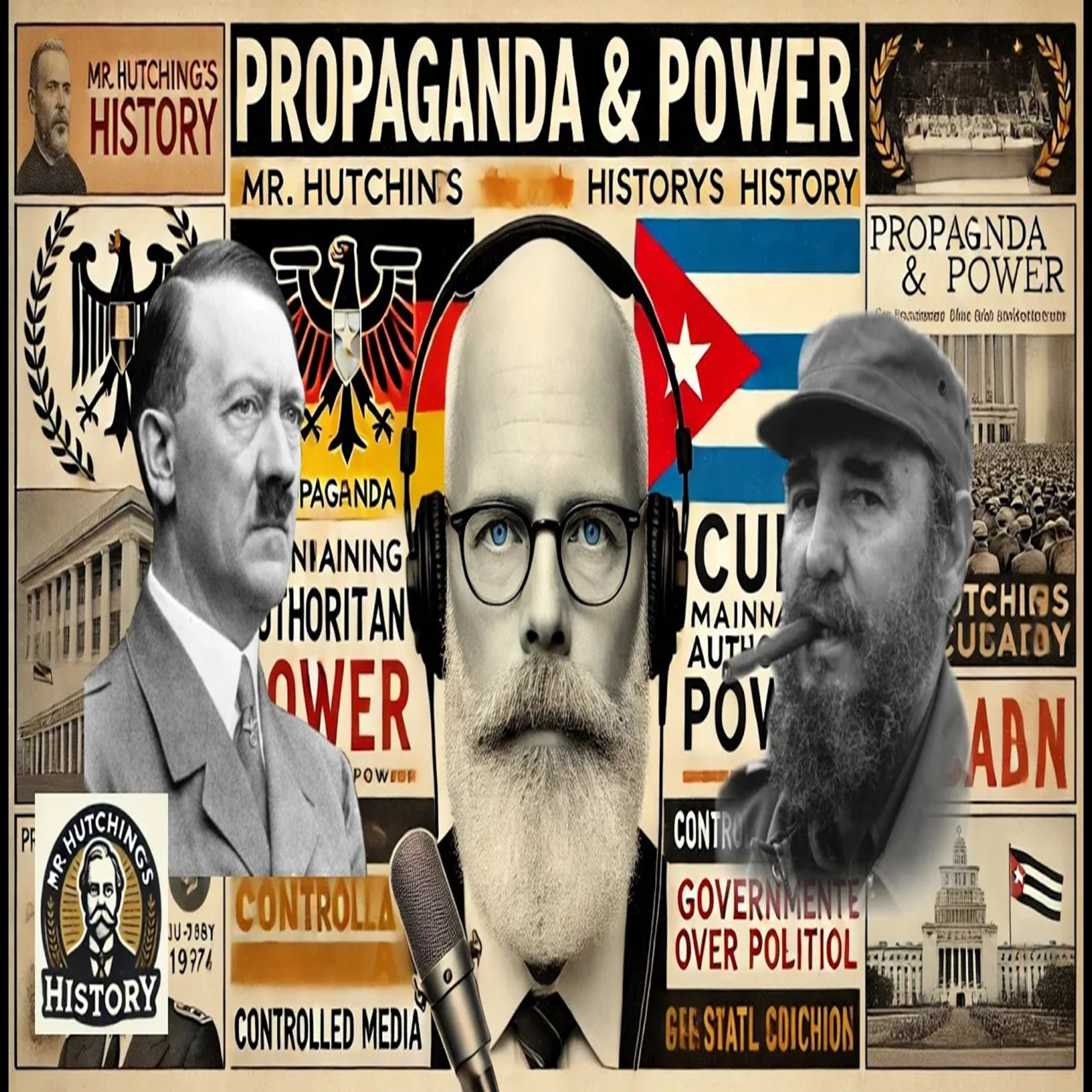 Mr. Hutchings HistoryPropaganda and Power—A Comparative Study of Hitler’s Germany and Castro’s CubaWelcome back to Mr. Hutchings History! In today’s episode, we dive into the critical role of propaganda in consolidating power in Nazi Germany under Adolf Hitler and revolutionary Cuba under Fidel Castro. We’ll explore how both leaders used propaganda to manipulate public opinion, create powerful myths, and maintain control. From Joseph Goebbels’ propaganda ministry in Nazi Germany to Castro’s media campaigns in Cuba, we analyze the methods, key figures, and messages that shaped each regime. Discover how Hitler’s Führer myth and Castro’s anti-imperialist narrative were spread through speeches, media, and public events, and how both lead...2024-11-2113 min
Mr. Hutchings HistoryPropaganda and Power—A Comparative Study of Hitler’s Germany and Castro’s CubaWelcome back to Mr. Hutchings History! In today’s episode, we dive into the critical role of propaganda in consolidating power in Nazi Germany under Adolf Hitler and revolutionary Cuba under Fidel Castro. We’ll explore how both leaders used propaganda to manipulate public opinion, create powerful myths, and maintain control. From Joseph Goebbels’ propaganda ministry in Nazi Germany to Castro’s media campaigns in Cuba, we analyze the methods, key figures, and messages that shaped each regime. Discover how Hitler’s Führer myth and Castro’s anti-imperialist narrative were spread through speeches, media, and public events, and how both lead...2024-11-2113 min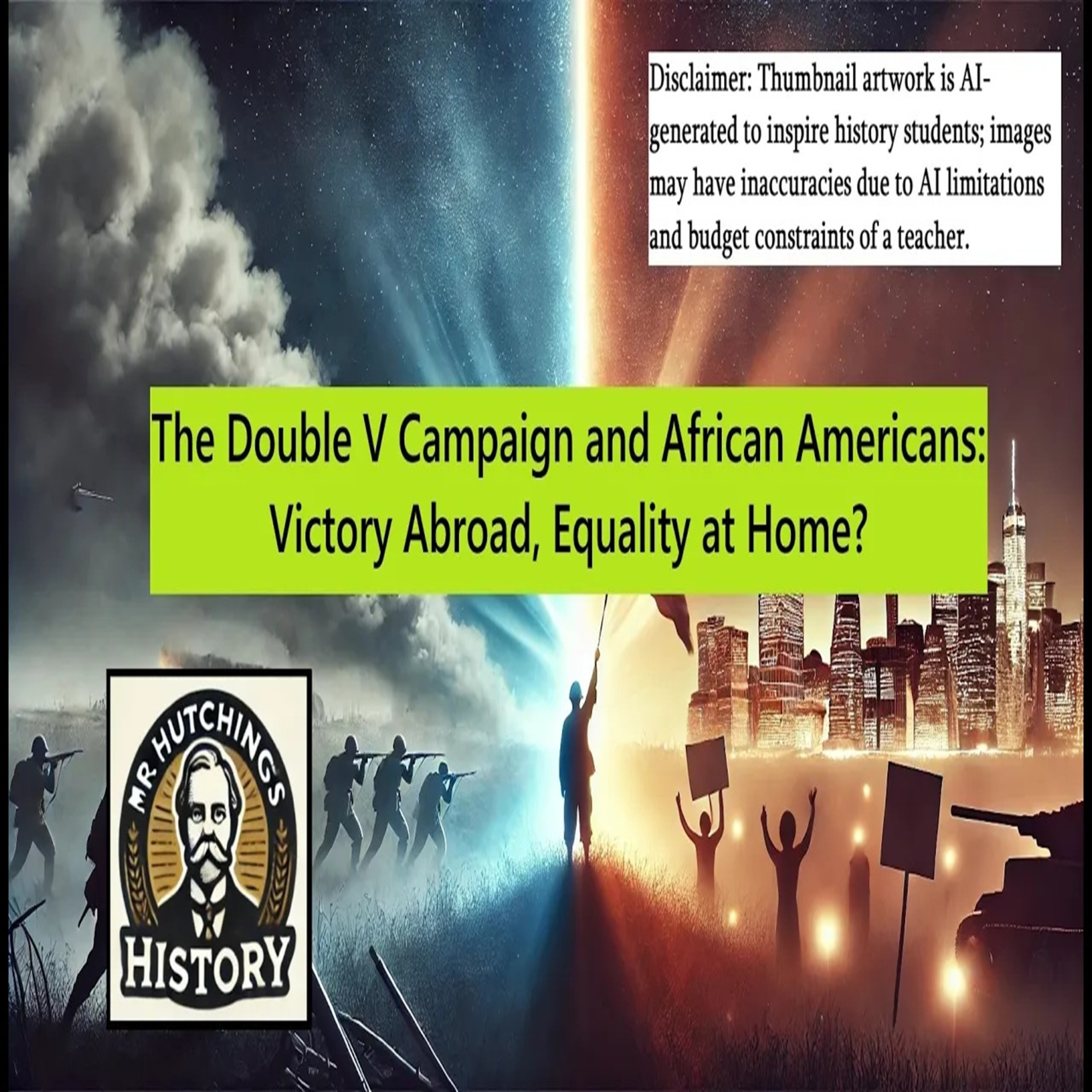 Mr. Hutchings HistoryThe Double V Campaign and African Americans: Victory Abroad, Equality at Home?Welcome back to Mr. Hutchings History! In this episode, we explore the Double V Campaign, an iconic movement during World War II that demanded victory over fascism abroad and equality at home. We’ll analyze how this campaign challenged racial injustice, highlighting the contributions and struggles of African Americans both in the military and the workforce. Learn about A. Philip Randolph’s leadership, Executive Order 8802, and the long-term impact of the campaign on the Civil Rights Movement. We’ll also dive into different historical perspectives on the campaign’s legacy and its role in reshaping African American political activism.
...2024-11-2119 min
Mr. Hutchings HistoryThe Double V Campaign and African Americans: Victory Abroad, Equality at Home?Welcome back to Mr. Hutchings History! In this episode, we explore the Double V Campaign, an iconic movement during World War II that demanded victory over fascism abroad and equality at home. We’ll analyze how this campaign challenged racial injustice, highlighting the contributions and struggles of African Americans both in the military and the workforce. Learn about A. Philip Randolph’s leadership, Executive Order 8802, and the long-term impact of the campaign on the Civil Rights Movement. We’ll also dive into different historical perspectives on the campaign’s legacy and its role in reshaping African American political activism.
...2024-11-2119 min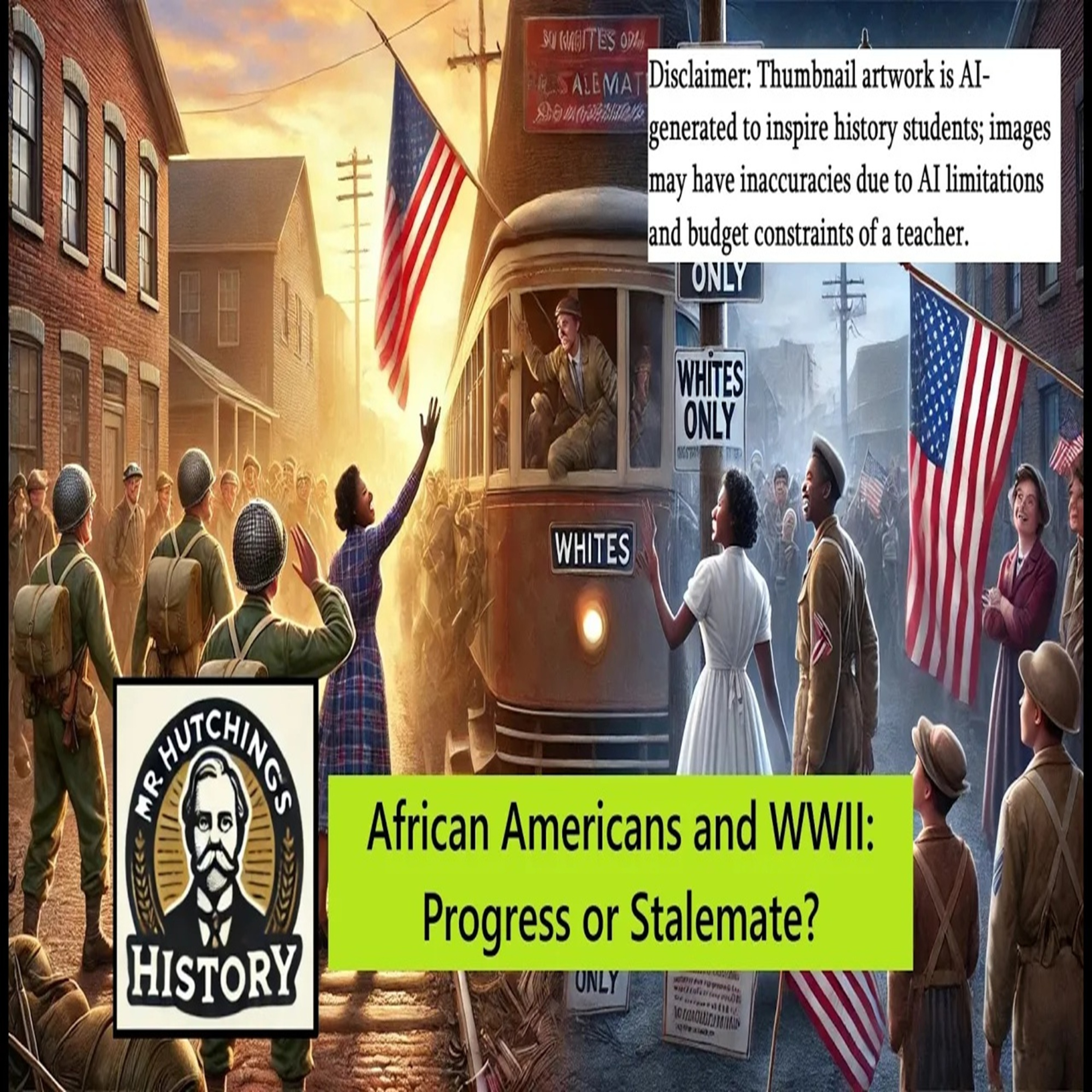 Mr. Hutchings HistoryAfrican Americans and WWII: Progress or Stalemate?Welcome to Mr. Hutchings History! In this episode, we explore whether World War II marked a positive shift for African Americans in the U.S. Using primary and secondary sources, we’ll evaluate the gains and limitations of the war for African Americans, from Executive Order 8802 to the rise of the Double V Campaign. We’ll examine how the war impacted military integration, the economy, and civil rights movements, as well as the ongoing resistance to racial equality. Through historical perspectives, we’ll discuss the paradox of African Americans fighting for democracy abroad while confronting systemic racism at home.
...2024-11-2115 min
Mr. Hutchings HistoryAfrican Americans and WWII: Progress or Stalemate?Welcome to Mr. Hutchings History! In this episode, we explore whether World War II marked a positive shift for African Americans in the U.S. Using primary and secondary sources, we’ll evaluate the gains and limitations of the war for African Americans, from Executive Order 8802 to the rise of the Double V Campaign. We’ll examine how the war impacted military integration, the economy, and civil rights movements, as well as the ongoing resistance to racial equality. Through historical perspectives, we’ll discuss the paradox of African Americans fighting for democracy abroad while confronting systemic racism at home.
...2024-11-2115 min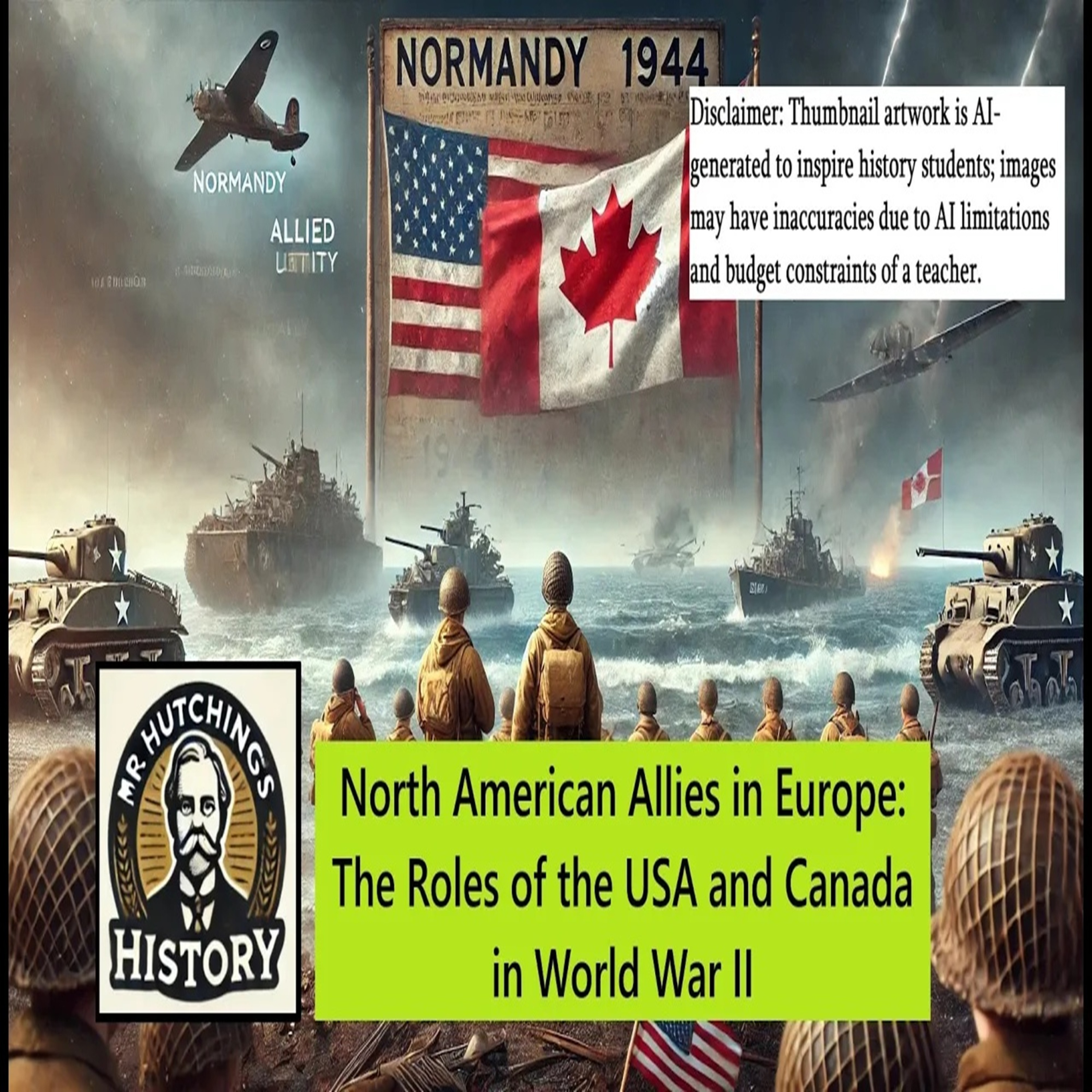 Mr. Hutchings HistoryNorth American Allies in Europe: The Roles of the USA and Canada in World War IIWelcome to Mr. Hutchings History! In this episode, we explore the pivotal contributions of the United States and Canada in the European theater during World War II. From Canada’s early involvement in 1939 to the U.S.’s decisive entry post-Pearl Harbor, we analyze key campaigns like Operation Torch, the Italian Campaign, and D-Day. We also highlight Canada’s valiant efforts at Dieppe and Juno Beach and discuss the critical provision of equipment, economic aid, and military training.
This episode offers a deep dive into the strategic decisions, logistical feats, and human courage that defined their roles. Drawin...2024-11-2118 min
Mr. Hutchings HistoryNorth American Allies in Europe: The Roles of the USA and Canada in World War IIWelcome to Mr. Hutchings History! In this episode, we explore the pivotal contributions of the United States and Canada in the European theater during World War II. From Canada’s early involvement in 1939 to the U.S.’s decisive entry post-Pearl Harbor, we analyze key campaigns like Operation Torch, the Italian Campaign, and D-Day. We also highlight Canada’s valiant efforts at Dieppe and Juno Beach and discuss the critical provision of equipment, economic aid, and military training.
This episode offers a deep dive into the strategic decisions, logistical feats, and human courage that defined their roles. Drawin...2024-11-2118 min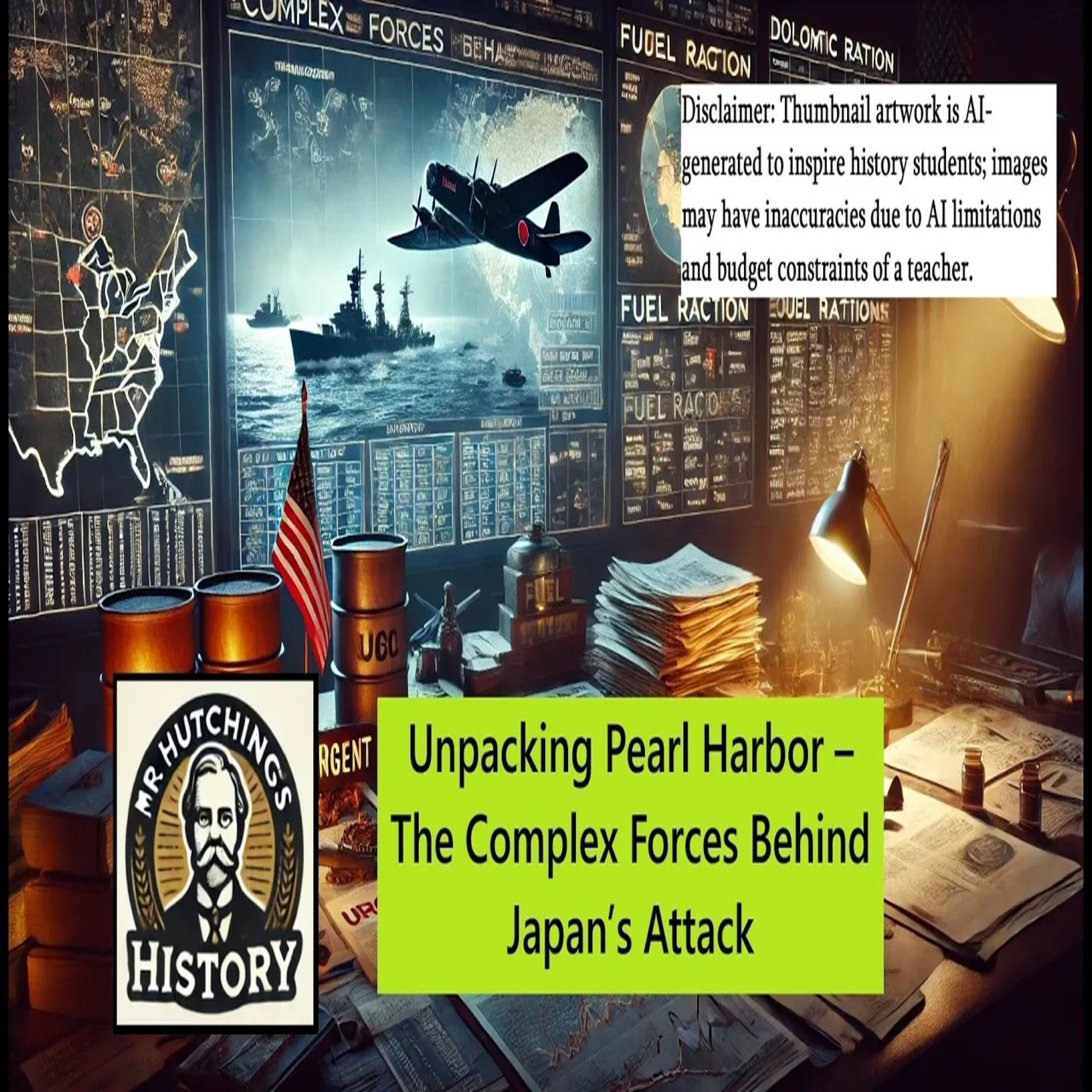 Mr. Hutchings HistoryUnpacking Pearl Harbor – The Complex Forces Behind Japan’s AttackWelcome to Mr. Hutchings History! In this episode, we dive into the multifaceted causes of Japan’s attack on Pearl Harbor on December 7, 1941. Was it driven by imperial ambitions, economic pressures, or failed diplomacy?
Explore how Japan’s need for resources, U.S. embargoes, and tensions over China escalated into conflict. We’ll discuss militarism under leaders like General Tojo, Admiral Yamamoto’s calculated gamble, and the devastating impact of the attack. Learn about the Rape of Nanjing’s influence on U.S. public opinion, strategic concerns over the Pacific, and the failure of diplomatic negotiations like the Hull N...2024-11-2111 min
Mr. Hutchings HistoryUnpacking Pearl Harbor – The Complex Forces Behind Japan’s AttackWelcome to Mr. Hutchings History! In this episode, we dive into the multifaceted causes of Japan’s attack on Pearl Harbor on December 7, 1941. Was it driven by imperial ambitions, economic pressures, or failed diplomacy?
Explore how Japan’s need for resources, U.S. embargoes, and tensions over China escalated into conflict. We’ll discuss militarism under leaders like General Tojo, Admiral Yamamoto’s calculated gamble, and the devastating impact of the attack. Learn about the Rape of Nanjing’s influence on U.S. public opinion, strategic concerns over the Pacific, and the failure of diplomatic negotiations like the Hull N...2024-11-2111 min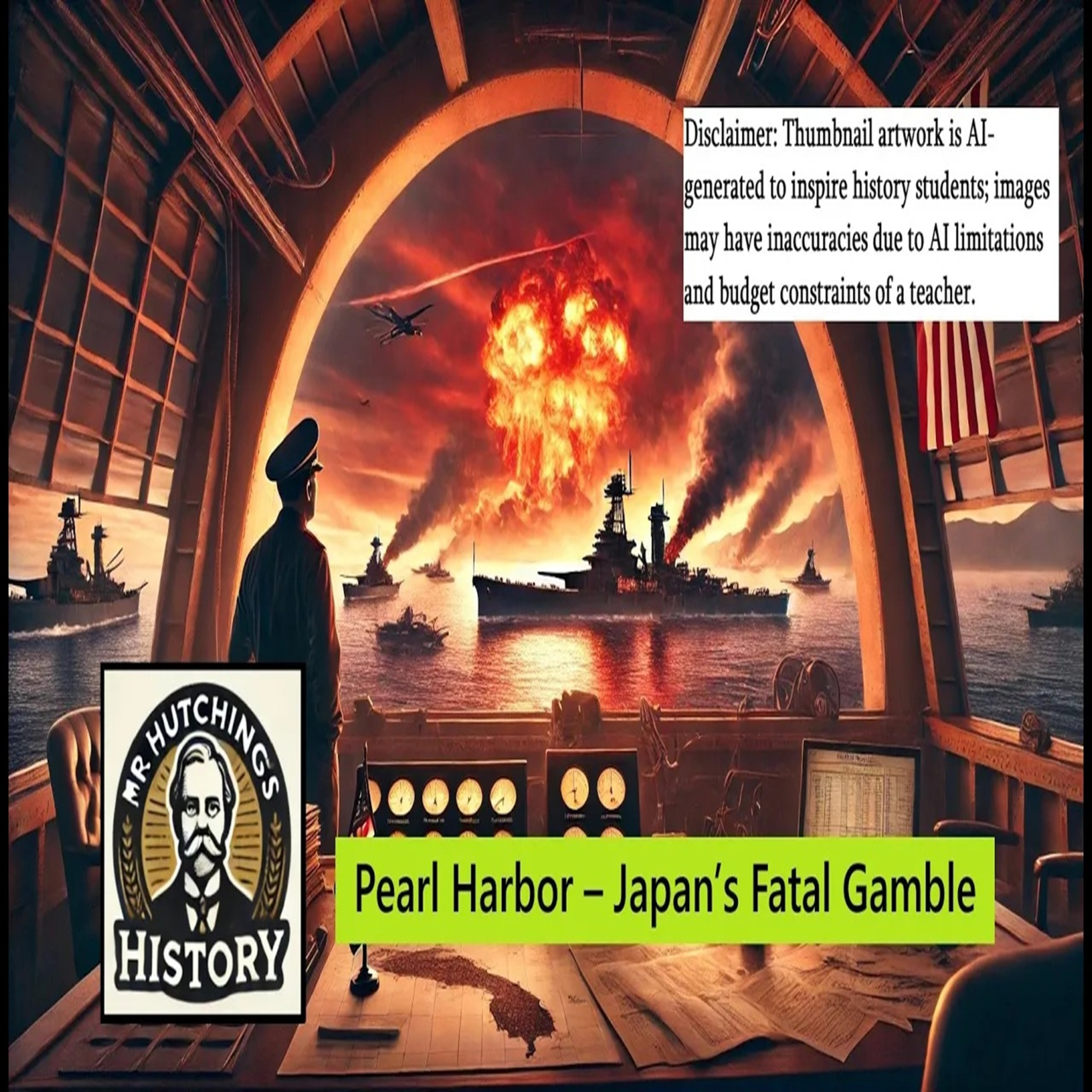 Mr. Hutchings HistoryPearl Harbor – Japan’s Fatal GambleWelcome to Mr. Hutchings History, where we explore pivotal moments in world history. In this episode, we analyze the Japanese attack on Pearl Harbor on December 7, 1941, and why Japan made this bold decision. Discover how Japan’s imperial ambitions, U.S. economic sanctions, and resource needs led to this fateful event.
We’ll discuss Admiral Yamamoto’s strategy, the devastation of the attack, and why it ultimately backfired, drawing the U.S. into World War II. Explore the immediate and long-term consequences, including America’s mobilization and the shift from isolationism to global engagement.
Unpack historic...2024-11-1915 min
Mr. Hutchings HistoryPearl Harbor – Japan’s Fatal GambleWelcome to Mr. Hutchings History, where we explore pivotal moments in world history. In this episode, we analyze the Japanese attack on Pearl Harbor on December 7, 1941, and why Japan made this bold decision. Discover how Japan’s imperial ambitions, U.S. economic sanctions, and resource needs led to this fateful event.
We’ll discuss Admiral Yamamoto’s strategy, the devastation of the attack, and why it ultimately backfired, drawing the U.S. into World War II. Explore the immediate and long-term consequences, including America’s mobilization and the shift from isolationism to global engagement.
Unpack historic...2024-11-1915 min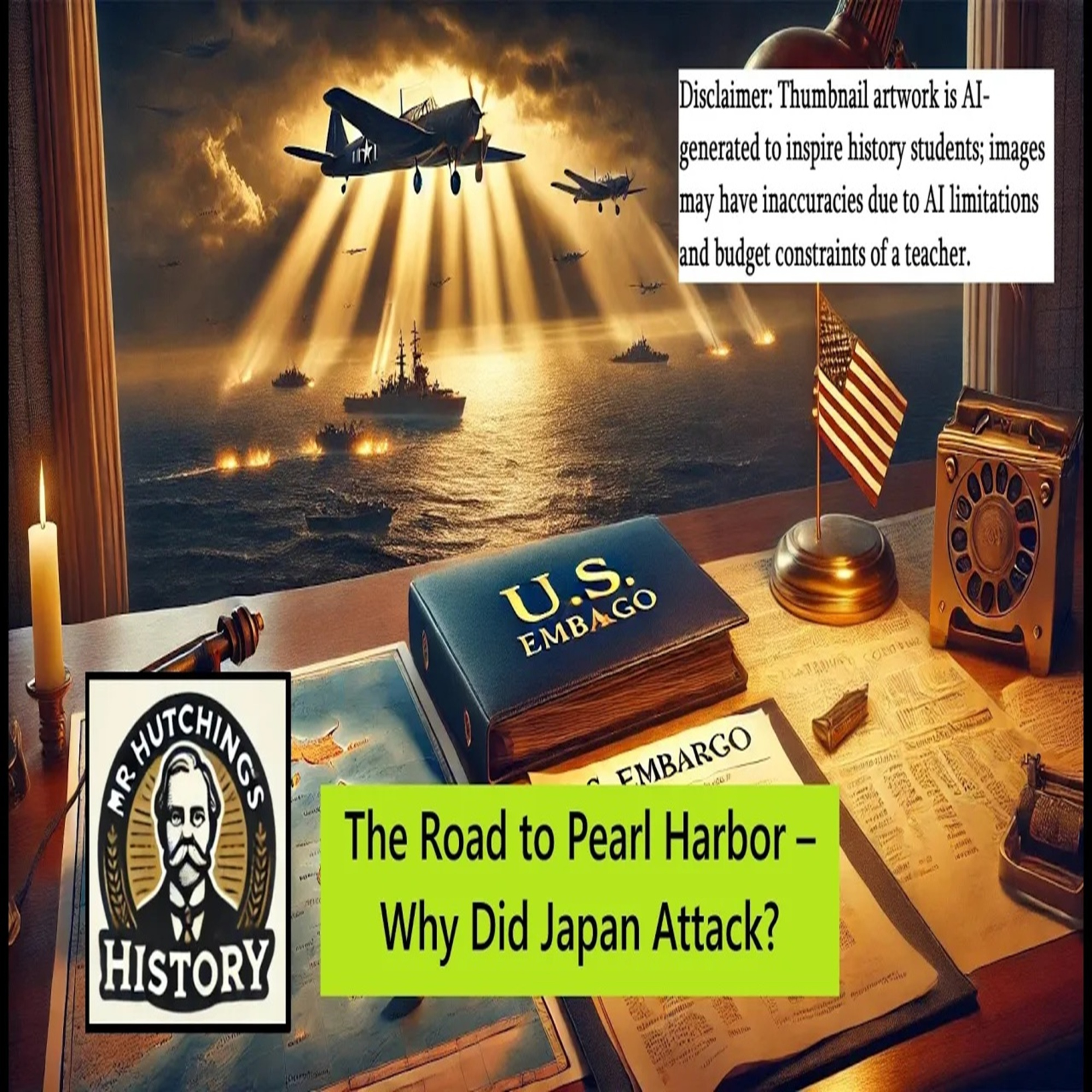 Mr. Hutchings HistoryThe Road to Pearl Harbor – Why Did Japan Attack?Welcome to Mr. Hutchings History, where we explore pivotal moments that changed the world. In this episode, we delve into the Japanese attack on Pearl Harbor in December 1941, a turning point that propelled the U.S. into World War II. Discover the geopolitical tensions, including Japan’s imperialist ambitions and the U.S. oil embargo, that set the stage for this bold strike.
Learn about Admiral Yamamoto’s strategic gamble, the devastating impact on the U.S. Pacific Fleet, and how the attack transformed public sentiment in the United States, galvanizing its entry into the global conflict. We’l...2024-11-1912 min
Mr. Hutchings HistoryThe Road to Pearl Harbor – Why Did Japan Attack?Welcome to Mr. Hutchings History, where we explore pivotal moments that changed the world. In this episode, we delve into the Japanese attack on Pearl Harbor in December 1941, a turning point that propelled the U.S. into World War II. Discover the geopolitical tensions, including Japan’s imperialist ambitions and the U.S. oil embargo, that set the stage for this bold strike.
Learn about Admiral Yamamoto’s strategic gamble, the devastating impact on the U.S. Pacific Fleet, and how the attack transformed public sentiment in the United States, galvanizing its entry into the global conflict. We’l...2024-11-1912 min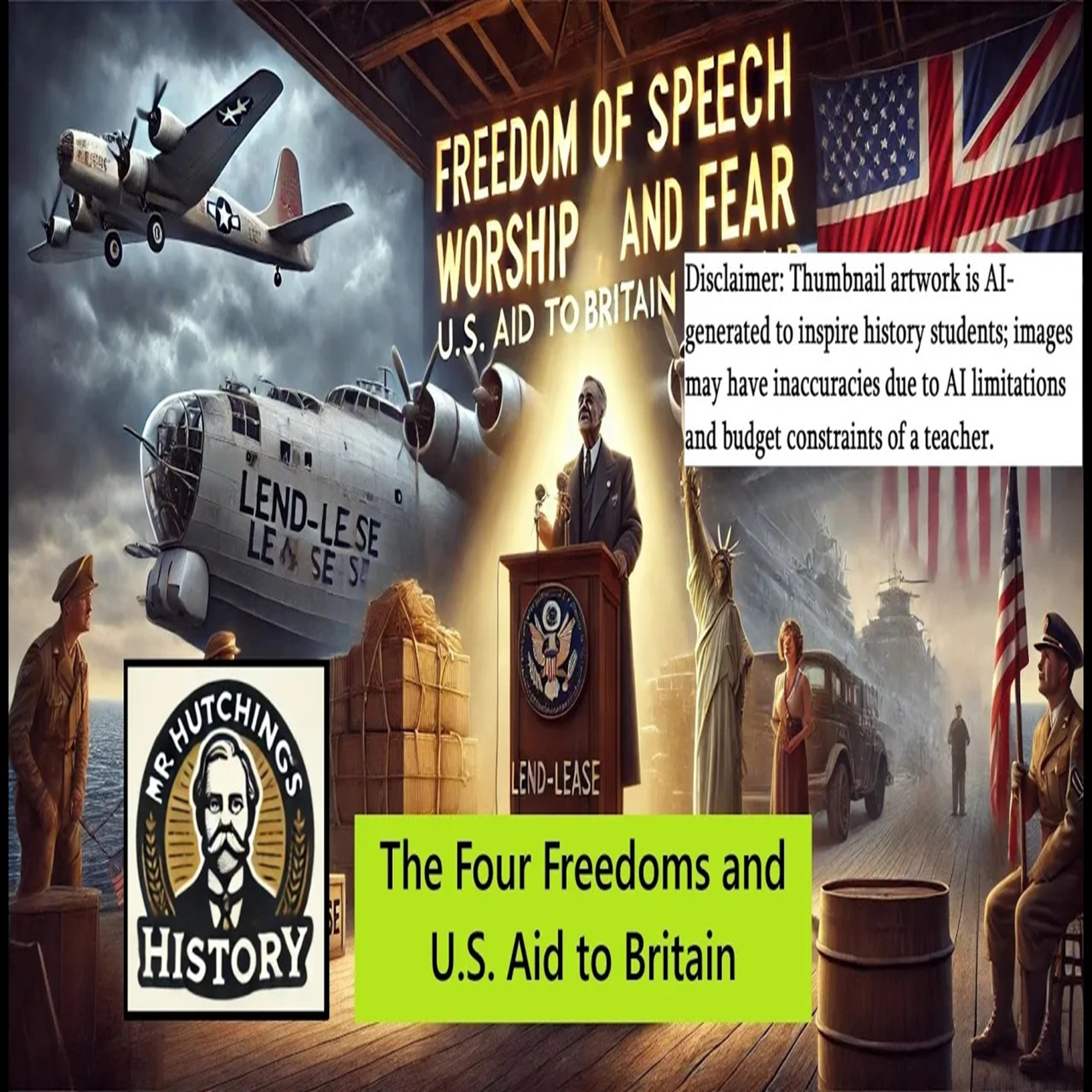 Mr. Hutchings HistoryThe Four Freedoms and U.S. Aid to BritainIn this episode of Mr. Hutchings History, we delve into Franklin D. Roosevelt’s iconic 1941 State of the Union address—the Four Freedoms Speech—and its role in justifying U.S. aid to Britain during World War II. Discover how Roosevelt framed the war as a fight for universal freedoms: speech, worship, freedom from want, and freedom from fear. We’ll also explore Norman Rockwell’s Four Freedoms paintings and their influence in rallying public support for the war.
Was this purely a moral crusade, or was Roosevelt driven by national security and economic interests? Join us as we unpa...2024-11-1917 min
Mr. Hutchings HistoryThe Four Freedoms and U.S. Aid to BritainIn this episode of Mr. Hutchings History, we delve into Franklin D. Roosevelt’s iconic 1941 State of the Union address—the Four Freedoms Speech—and its role in justifying U.S. aid to Britain during World War II. Discover how Roosevelt framed the war as a fight for universal freedoms: speech, worship, freedom from want, and freedom from fear. We’ll also explore Norman Rockwell’s Four Freedoms paintings and their influence in rallying public support for the war.
Was this purely a moral crusade, or was Roosevelt driven by national security and economic interests? Join us as we unpa...2024-11-1917 min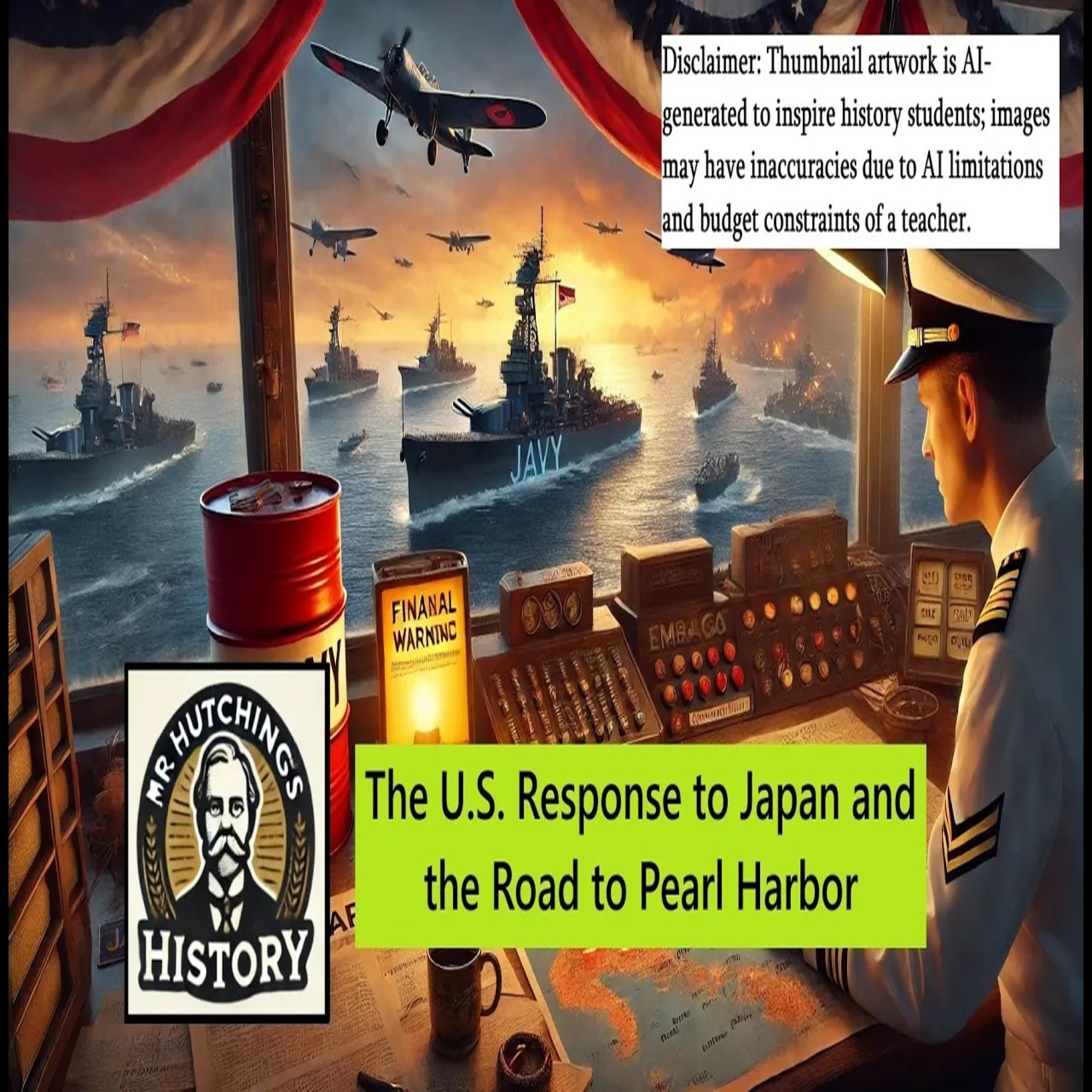 Mr. Hutchings HistoryThe U.S. Response to Japan and the Road to Pearl HarborWelcome to Mr. Hutchings History! In this episode, we explore how escalating tensions between the United States and Japan in the late 1930s and early 1940s led to the attack on Pearl Harbor. We’ll discuss key policies like Roosevelt’s oil embargo, the Hull Note, and aid to China, examining how Japan’s expansionism and U.S. responses transformed their relationship from strained diplomacy to inevitable conflict.
Key topics include the U.S. shift from neutrality to confrontation, Japan’s ambitions in Southeast Asia, and the historiographical debates surrounding Roosevelt’s strategy. Was the U.S. oil embarg...2024-11-1921 min
Mr. Hutchings HistoryThe U.S. Response to Japan and the Road to Pearl HarborWelcome to Mr. Hutchings History! In this episode, we explore how escalating tensions between the United States and Japan in the late 1930s and early 1940s led to the attack on Pearl Harbor. We’ll discuss key policies like Roosevelt’s oil embargo, the Hull Note, and aid to China, examining how Japan’s expansionism and U.S. responses transformed their relationship from strained diplomacy to inevitable conflict.
Key topics include the U.S. shift from neutrality to confrontation, Japan’s ambitions in Southeast Asia, and the historiographical debates surrounding Roosevelt’s strategy. Was the U.S. oil embarg...2024-11-1921 min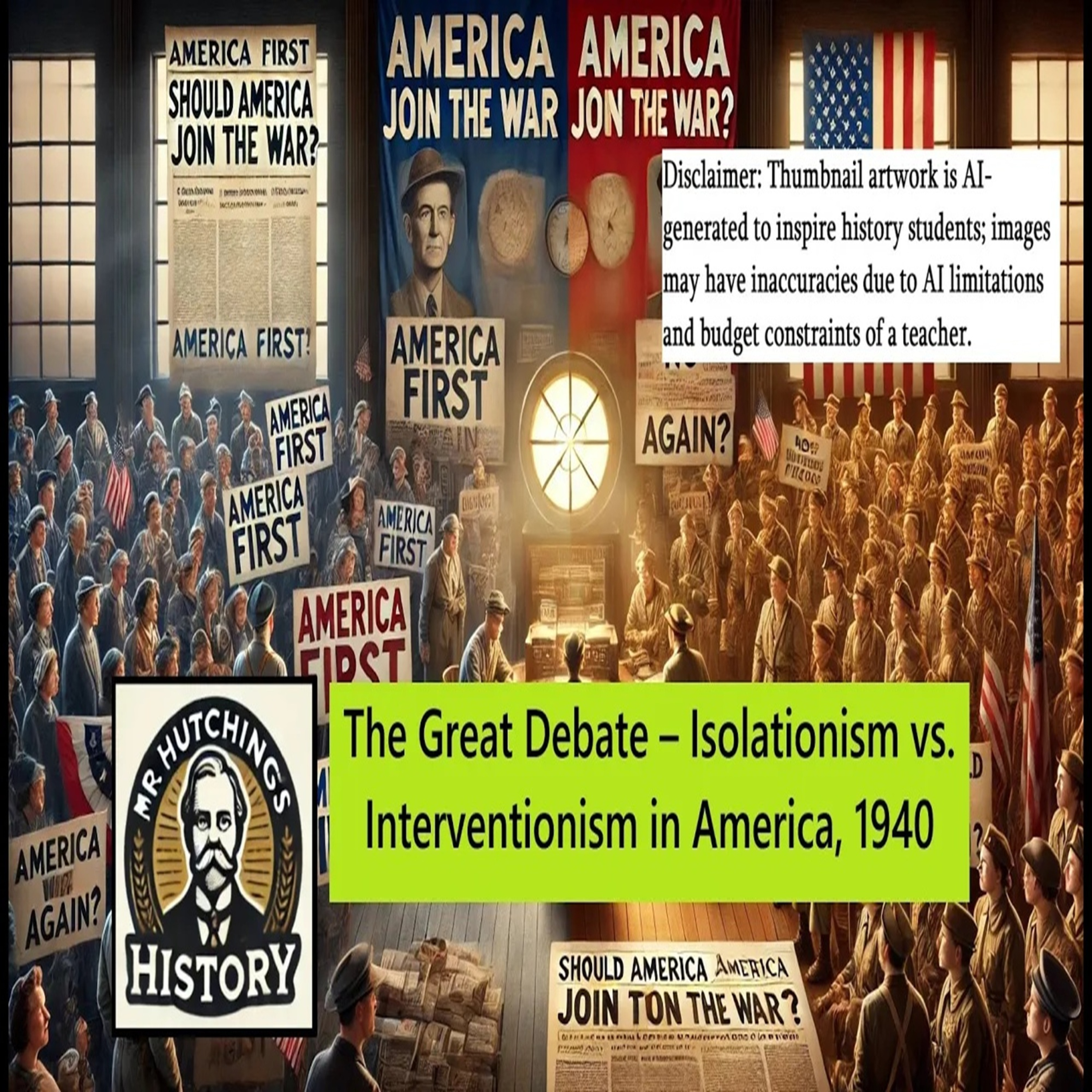 Mr. Hutchings HistoryThe Great Debate – Isolationism vs. Interventionism in America, 1940Welcome to Mr. Hutchings History, where we explore pivotal moments in world history for advanced IB DP History students. This episode examines the critical debate of 1940-41: should America stay isolated or intervene in World War II?
We’ll unpack the key arguments for isolationism, championed by figures like Charles Lindbergh and the America First Committee, rooted in fears of war profiteering, economic recovery, and national security. On the other side, interventionists like Franklin D. Roosevelt and Cordell Hull argued for aiding Britain and the Allies to combat fascism and protect democracy.
Key events include th...2024-11-1919 min
Mr. Hutchings HistoryThe Great Debate – Isolationism vs. Interventionism in America, 1940Welcome to Mr. Hutchings History, where we explore pivotal moments in world history for advanced IB DP History students. This episode examines the critical debate of 1940-41: should America stay isolated or intervene in World War II?
We’ll unpack the key arguments for isolationism, championed by figures like Charles Lindbergh and the America First Committee, rooted in fears of war profiteering, economic recovery, and national security. On the other side, interventionists like Franklin D. Roosevelt and Cordell Hull argued for aiding Britain and the Allies to combat fascism and protect democracy.
Key events include th...2024-11-1919 min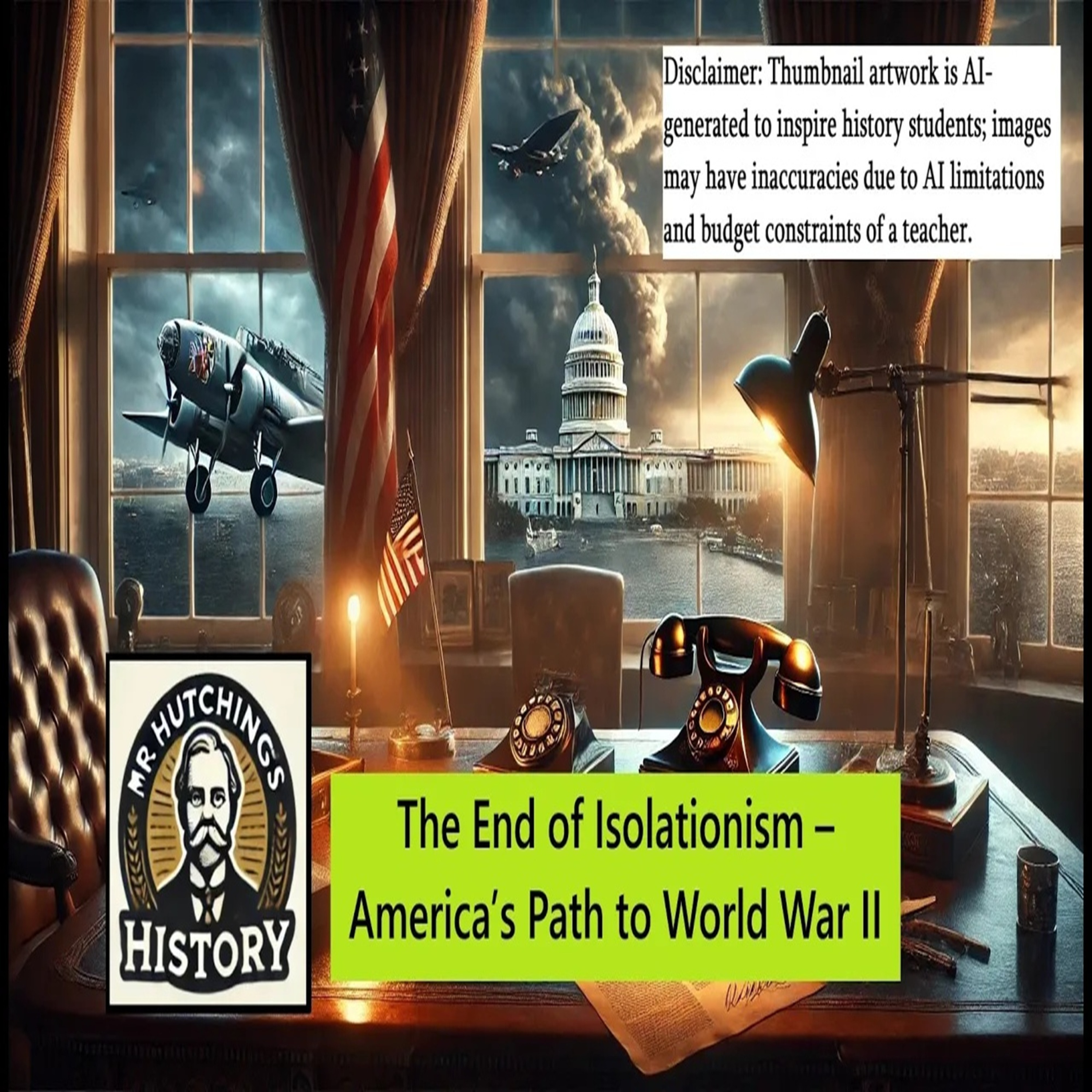 Mr. Hutchings HistoryThe End of Isolationism – America’s Path to World War IIIn this episode of Mr. Hutchings History, we explore how World War II transformed America’s isolationist stance, shifting the nation toward interventionism. Tailored for IB DP History students, this lecture examines the fierce debates of the time, highlighting figures like Franklin D. Roosevelt, Charles Lindbergh, and Cordell Hull.
Key topics include the Neutrality Acts, the America First Committee, and policies like cash-and-carry and Lend-Lease that set the stage for U.S. involvement in the war. We analyze pivotal events such as the Blitz and the attack on Pearl Harbor, which shattered isolationism and unified the nation ag...2024-11-1913 min
Mr. Hutchings HistoryThe End of Isolationism – America’s Path to World War IIIn this episode of Mr. Hutchings History, we explore how World War II transformed America’s isolationist stance, shifting the nation toward interventionism. Tailored for IB DP History students, this lecture examines the fierce debates of the time, highlighting figures like Franklin D. Roosevelt, Charles Lindbergh, and Cordell Hull.
Key topics include the Neutrality Acts, the America First Committee, and policies like cash-and-carry and Lend-Lease that set the stage for U.S. involvement in the war. We analyze pivotal events such as the Blitz and the attack on Pearl Harbor, which shattered isolationism and unified the nation ag...2024-11-1913 min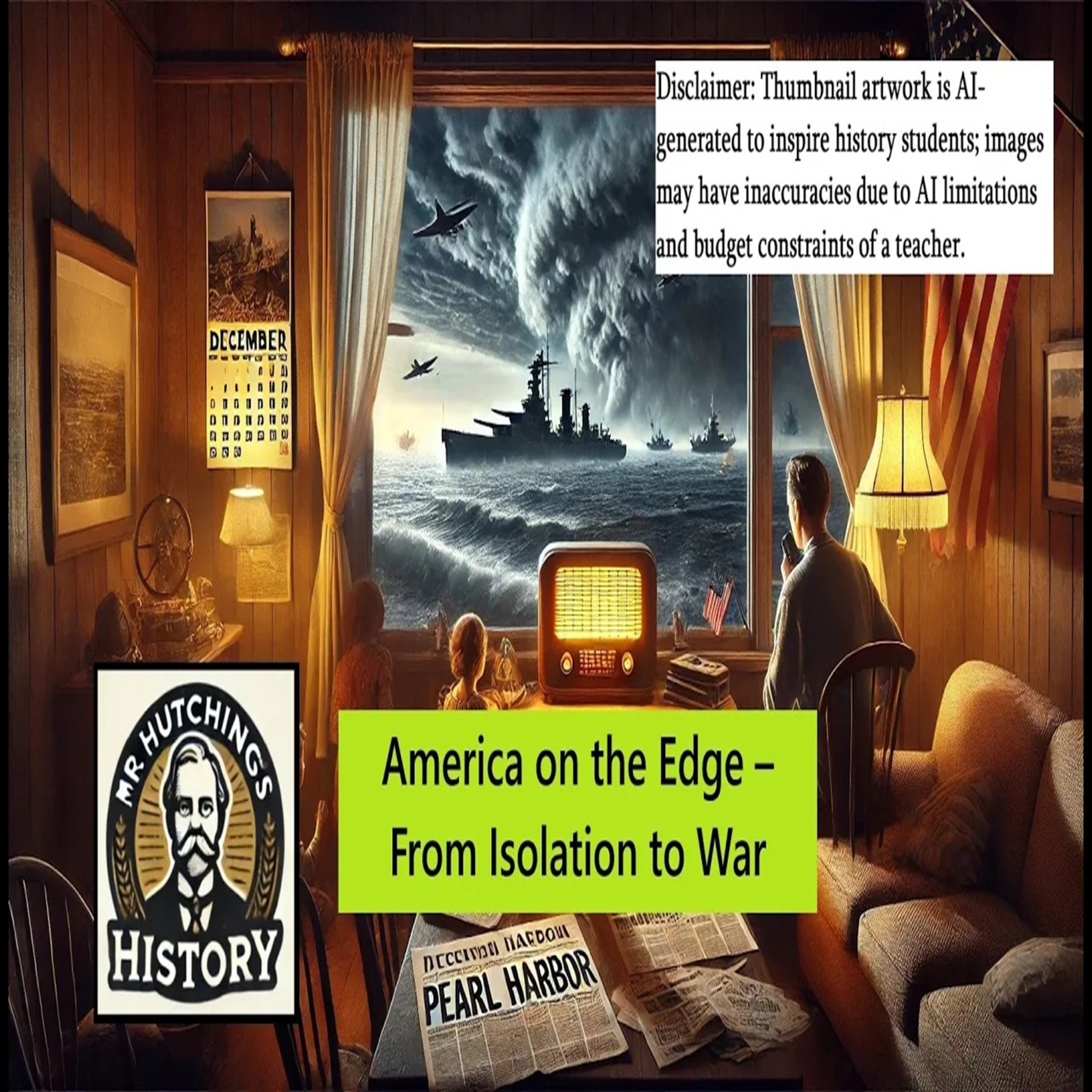 Mr. Hutchings HistoryAmerica on the Edge – From Isolation to WarIn this episode of Mr. Hutchings History, we explore the pivotal shift in U.S. foreign policy during the outbreak of World War II. Designed for advanced IB DP History students, this discussion examines how America moved from strict isolationism to active involvement in the global conflict.
Key topics include President Franklin D. Roosevelt’s balancing act between public sentiment and international responsibilities, the influence of the Neutrality Acts, and the formation of the America First Committee led by Charles Lindbergh. We also analyze Roosevelt's strategic policies, such as the cash-and-carry provision, the Destroyers for Bases Agreement, an...2024-11-1911 min
Mr. Hutchings HistoryAmerica on the Edge – From Isolation to WarIn this episode of Mr. Hutchings History, we explore the pivotal shift in U.S. foreign policy during the outbreak of World War II. Designed for advanced IB DP History students, this discussion examines how America moved from strict isolationism to active involvement in the global conflict.
Key topics include President Franklin D. Roosevelt’s balancing act between public sentiment and international responsibilities, the influence of the Neutrality Acts, and the formation of the America First Committee led by Charles Lindbergh. We also analyze Roosevelt's strategic policies, such as the cash-and-carry provision, the Destroyers for Bases Agreement, an...2024-11-1911 min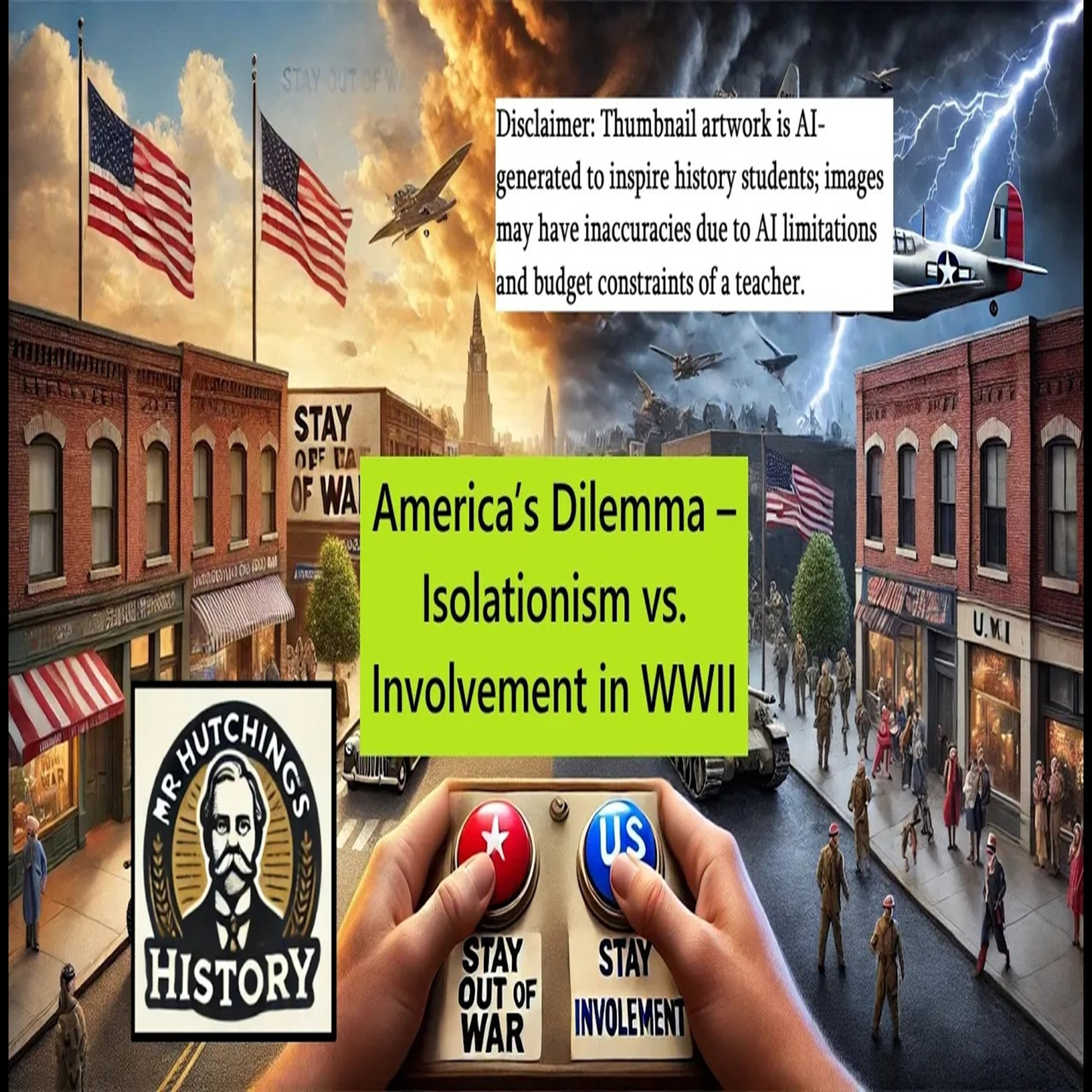 Mr. Hutchings HistoryAmerica’s Dilemma – Isolationism vs. Involvement in WWIIIn this episode of Mr. Hutchings History, we analyze the pivotal debate over U.S. isolationism versus intervention during the outbreak of World War II. Tailored for IB DP History students, this discussion delves into how President Franklin D. Roosevelt navigated public sentiment and Congressional resistance while responding to the rising threats of Nazi Germany and Imperial Japan.
Explore the impact of the Neutrality Acts, the rise of the America First Committee led by Charles Lindbergh, and Roosevelt’s strategic policies like the Lend-Lease Act that slowly eroded isolationism. Discover how the attack on Pearl Harbor in De...2024-11-1917 min
Mr. Hutchings HistoryAmerica’s Dilemma – Isolationism vs. Involvement in WWIIIn this episode of Mr. Hutchings History, we analyze the pivotal debate over U.S. isolationism versus intervention during the outbreak of World War II. Tailored for IB DP History students, this discussion delves into how President Franklin D. Roosevelt navigated public sentiment and Congressional resistance while responding to the rising threats of Nazi Germany and Imperial Japan.
Explore the impact of the Neutrality Acts, the rise of the America First Committee led by Charles Lindbergh, and Roosevelt’s strategic policies like the Lend-Lease Act that slowly eroded isolationism. Discover how the attack on Pearl Harbor in De...2024-11-1917 min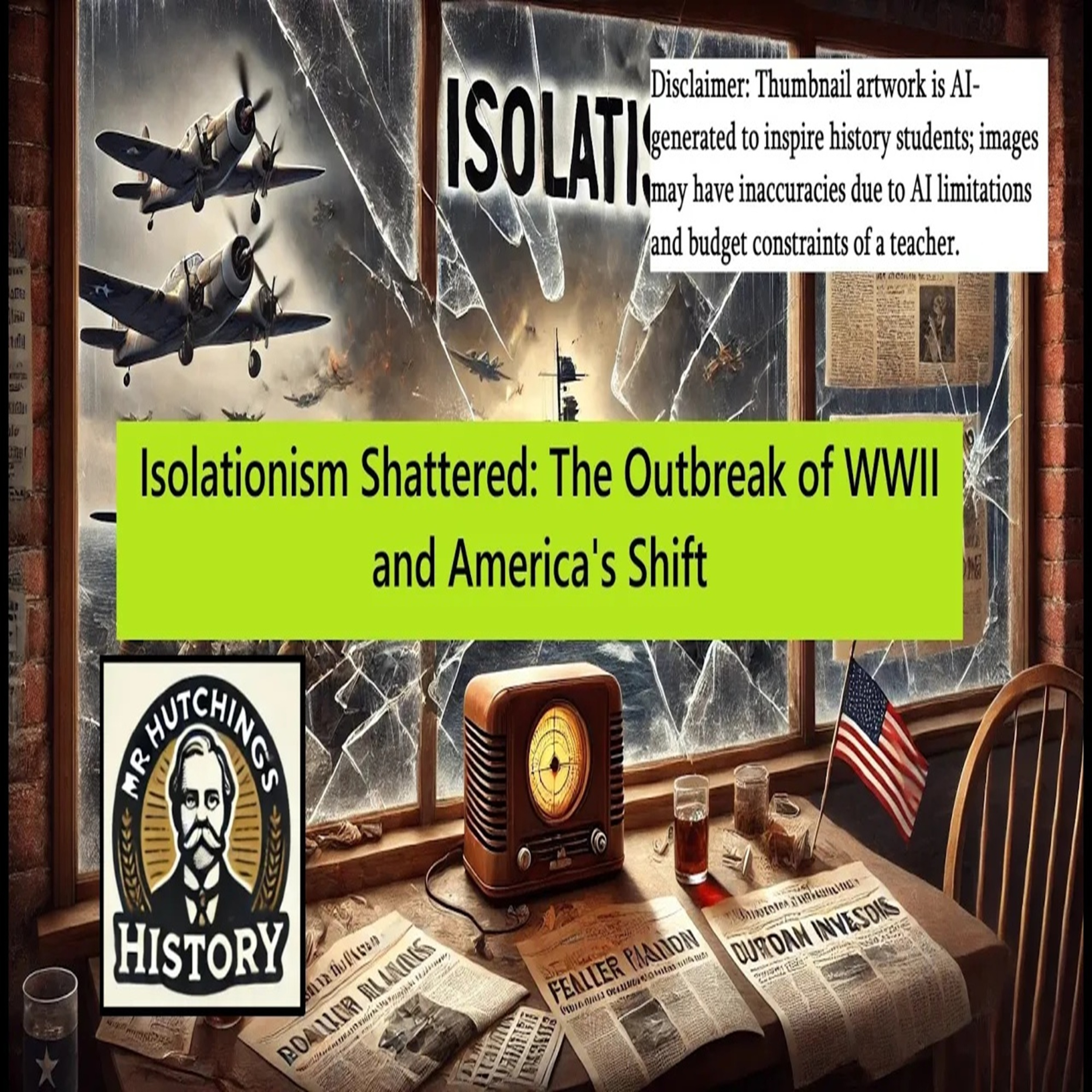 Mr. Hutchings HistoryIsolationism Shattered: The Outbreak of WWII and America's ShiftIn this episode of Mr. Hutchings History, we explore how the outbreak of World War II transformed the United States from a staunchly isolationist nation to a global power committed to intervention. A must-listen for IB DP History students, this discussion examines the evolution of U.S. foreign policy, from the Neutrality Acts of the 1930s to the Lend-Lease Act and the attack on Pearl Harbor.
Discover the rise of the America First Committee, led by figures like Charles Lindbergh, and its role in shaping public opinion. Delve into Roosevelt's strategic navigation of isolationist sentiment and his...2024-11-1918 min
Mr. Hutchings HistoryIsolationism Shattered: The Outbreak of WWII and America's ShiftIn this episode of Mr. Hutchings History, we explore how the outbreak of World War II transformed the United States from a staunchly isolationist nation to a global power committed to intervention. A must-listen for IB DP History students, this discussion examines the evolution of U.S. foreign policy, from the Neutrality Acts of the 1930s to the Lend-Lease Act and the attack on Pearl Harbor.
Discover the rise of the America First Committee, led by figures like Charles Lindbergh, and its role in shaping public opinion. Delve into Roosevelt's strategic navigation of isolationist sentiment and his...2024-11-1918 min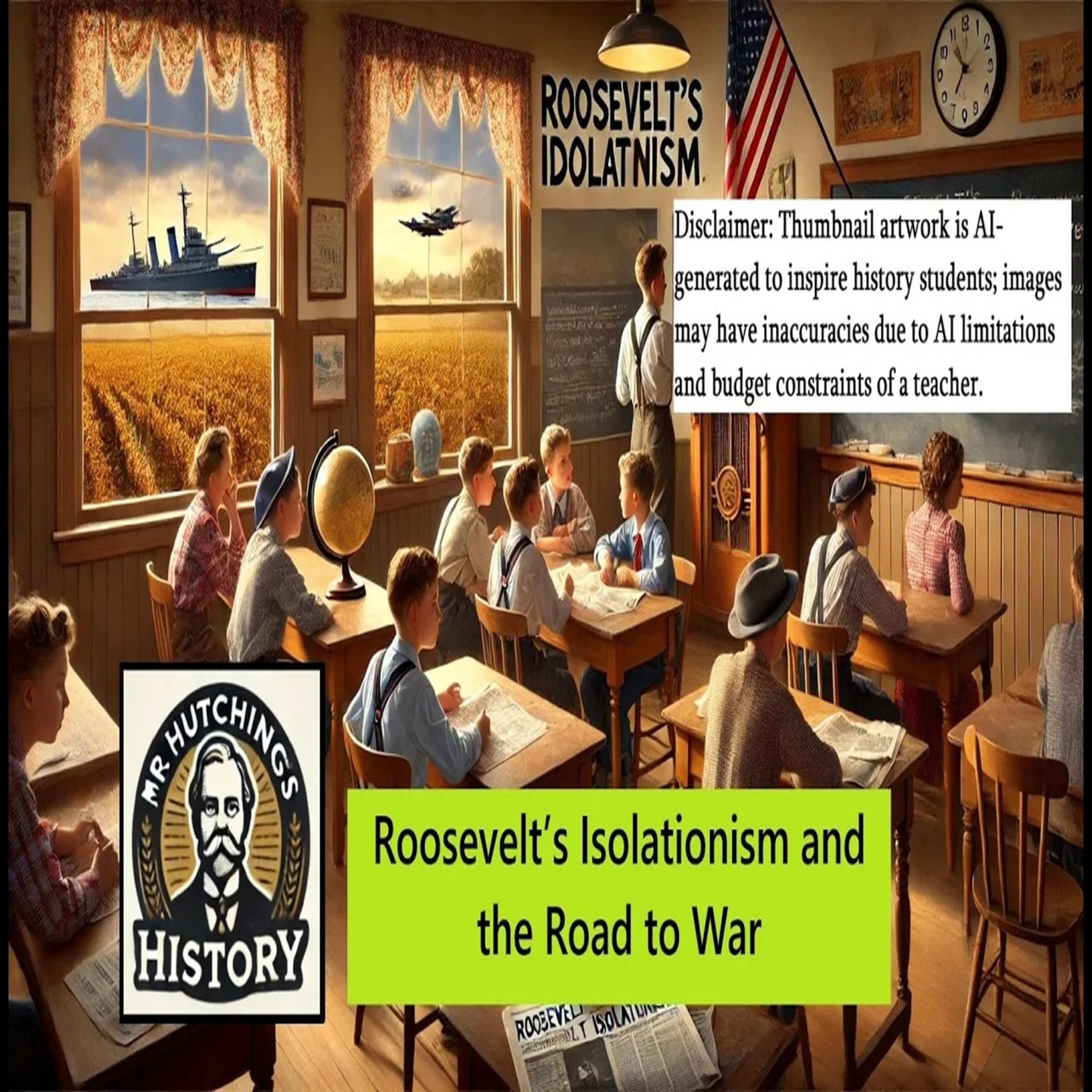 Mr. Hutchings HistoryRoosevelt’s Isolationism and the Road to WarExplore how Franklin D. Roosevelt navigated the challenging balance between domestic isolationism and international threats in this episode of Mr. Hutchings History. From the Great Depression's domestic focus to the passage of the Neutrality Acts (1935–1937), we examine how U.S. foreign policy evolved under intense public and Congressional pressure to avoid entanglement in global conflicts.
Delve into key events like the Nye Committee findings, the Spanish Civil War, and Japan’s invasion of China, which tested Roosevelt’s commitment to neutrality. Discover how Roosevelt used strategic measures like the “cash-and-carry” clause and the Lend-Lease Act to slowly shift the...2024-11-1911 min
Mr. Hutchings HistoryRoosevelt’s Isolationism and the Road to WarExplore how Franklin D. Roosevelt navigated the challenging balance between domestic isolationism and international threats in this episode of Mr. Hutchings History. From the Great Depression's domestic focus to the passage of the Neutrality Acts (1935–1937), we examine how U.S. foreign policy evolved under intense public and Congressional pressure to avoid entanglement in global conflicts.
Delve into key events like the Nye Committee findings, the Spanish Civil War, and Japan’s invasion of China, which tested Roosevelt’s commitment to neutrality. Discover how Roosevelt used strategic measures like the “cash-and-carry” clause and the Lend-Lease Act to slowly shift the...2024-11-1911 min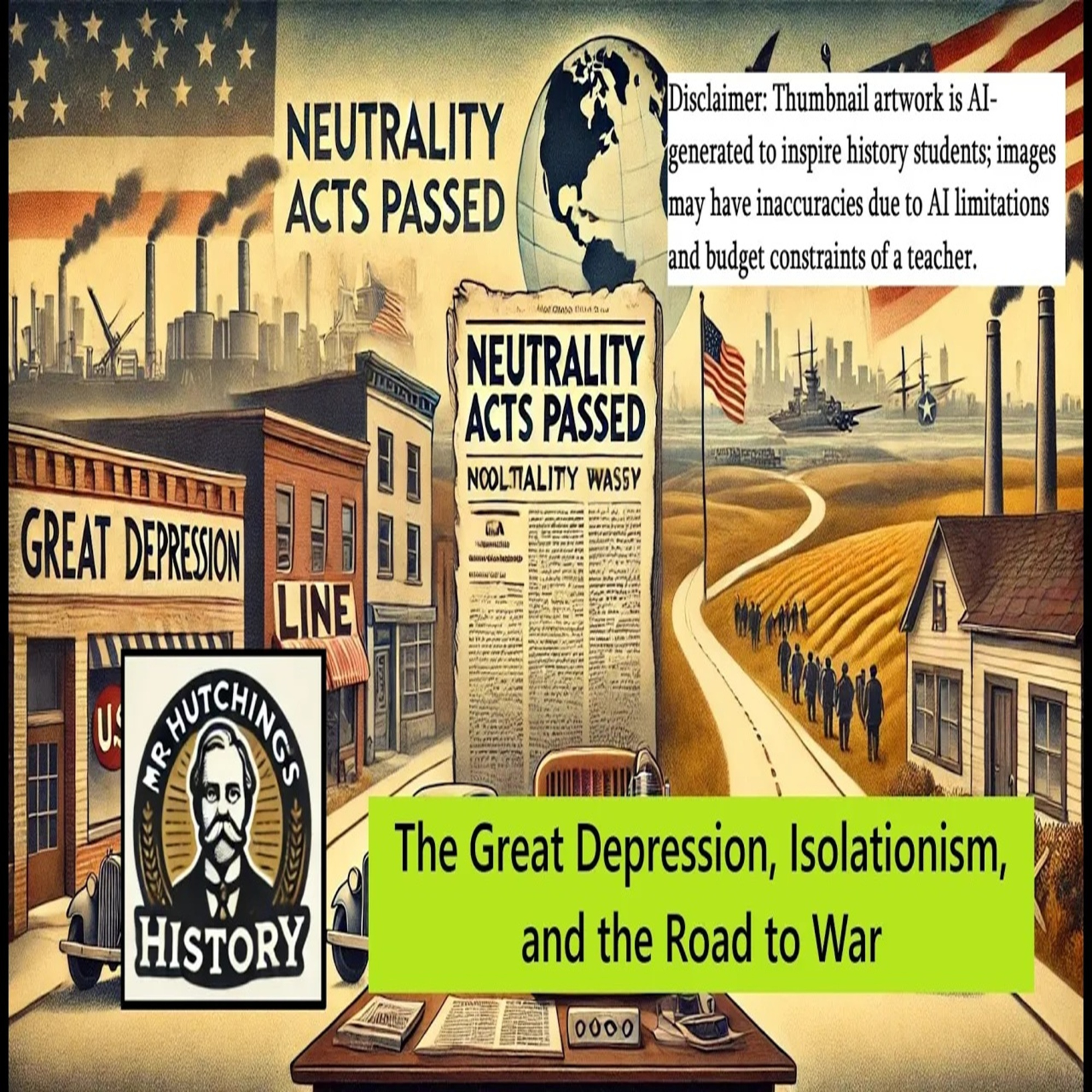 Mr. Hutchings HistoryThe Great Depression, Isolationism, and the Road to WarIn this episode of Mr. Hutchings History, we explore the complex interplay between the Great Depression, isolationism, and America’s eventual path to World War II. The 1930s saw the United States grappling with domestic recovery through Roosevelt’s New Deal while resisting foreign entanglements amidst growing global tensions.
From the impact of World War I and the disillusionment that followed, to the Neutrality Acts that codified isolationism, we trace how economic hardship and public opinion shaped U.S. foreign policy. Learn how Roosevelt navigated the challenges of supporting Allies without direct involvement, using measures like “cash-and-carry” and Lend...2024-11-1928 min
Mr. Hutchings HistoryThe Great Depression, Isolationism, and the Road to WarIn this episode of Mr. Hutchings History, we explore the complex interplay between the Great Depression, isolationism, and America’s eventual path to World War II. The 1930s saw the United States grappling with domestic recovery through Roosevelt’s New Deal while resisting foreign entanglements amidst growing global tensions.
From the impact of World War I and the disillusionment that followed, to the Neutrality Acts that codified isolationism, we trace how economic hardship and public opinion shaped U.S. foreign policy. Learn how Roosevelt navigated the challenges of supporting Allies without direct involvement, using measures like “cash-and-carry” and Lend...2024-11-1928 min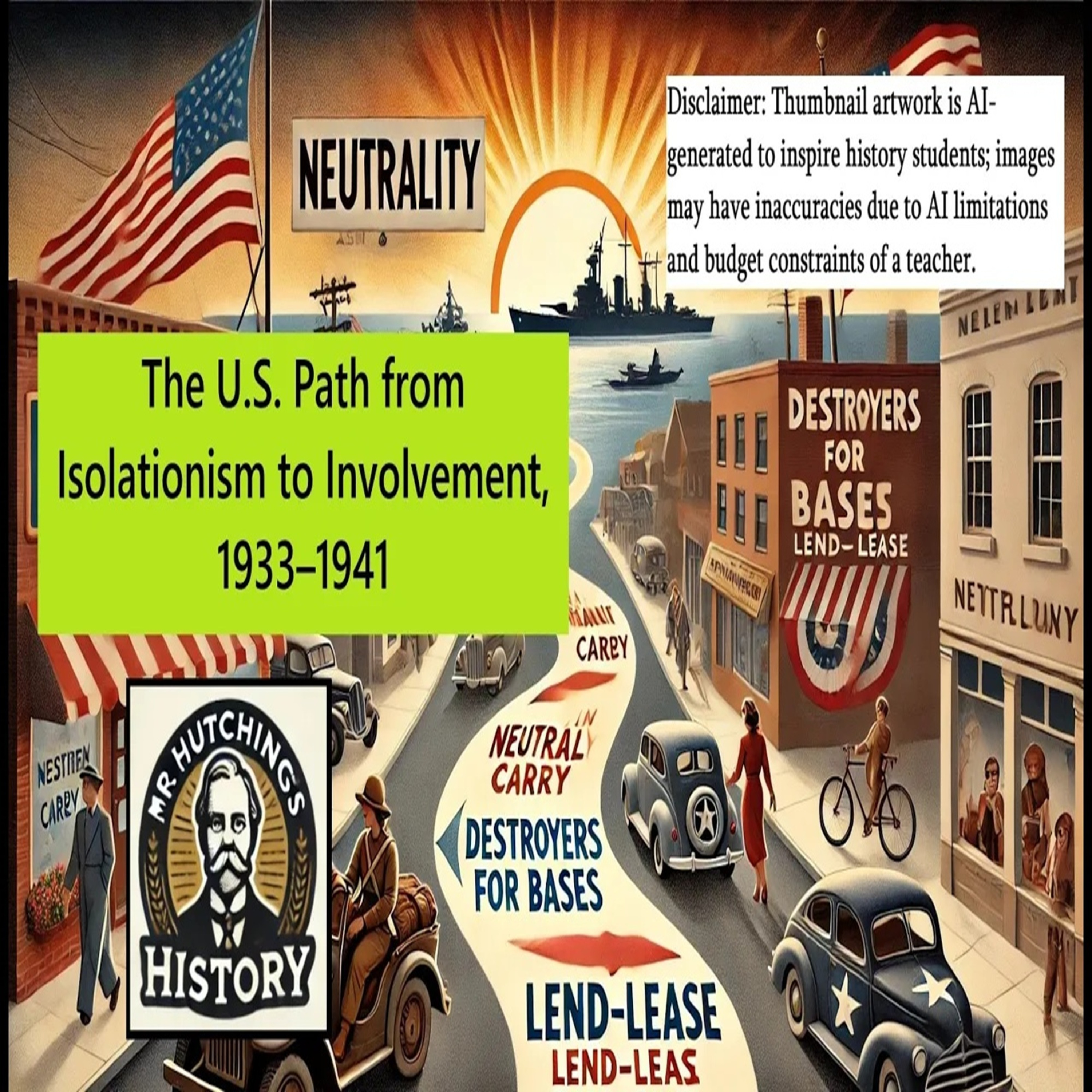 Mr. Hutchings HistoryThe U.S. Path from Isolationism to Involvement, 1933–1941In this episode of Mr. Hutchings History, we analyze the United States’ gradual shift from isolationism to global involvement between 1933 and 1941. Amid the rise of fascism in Europe and Japan’s imperial ambitions, the U.S. maintained neutrality under laws like the Neutrality Acts. Yet, behind the scenes, President Franklin D. Roosevelt cautiously navigated domestic isolationist sentiment while responding to global threats through initiatives like the Quarantine Speech, Cash-and-Carry, and eventually the Lend-Lease Act.
Key moments, such as Germany’s reoccupation of the Rhineland, the Spanish Civil War, and the Munich Agreement, highlighted the challenges of staying detach...2024-11-1911 min
Mr. Hutchings HistoryThe U.S. Path from Isolationism to Involvement, 1933–1941In this episode of Mr. Hutchings History, we analyze the United States’ gradual shift from isolationism to global involvement between 1933 and 1941. Amid the rise of fascism in Europe and Japan’s imperial ambitions, the U.S. maintained neutrality under laws like the Neutrality Acts. Yet, behind the scenes, President Franklin D. Roosevelt cautiously navigated domestic isolationist sentiment while responding to global threats through initiatives like the Quarantine Speech, Cash-and-Carry, and eventually the Lend-Lease Act.
Key moments, such as Germany’s reoccupation of the Rhineland, the Spanish Civil War, and the Munich Agreement, highlighted the challenges of staying detach...2024-11-1911 min Mr. Hutchings HistoryThe U.S. and the World—Isolationism, Diplomacy, and Global Engagement in the 1920sIn this episode of Mr. Hutchings History, we explore U.S. foreign policy during the 1920s and early 1930s to address whether the United States truly pursued isolationism after World War I. From the rejection of the Treaty of Versailles and League of Nations to diplomatic initiatives like the Washington Naval Conference, the Kellogg-Briand Pact, and the Dawes Plan, we examine the complexities of America’s global involvement during this era.
We analyze how economic diplomacy, as seen in the Dawes Plan, and legal principles, like the Stimson Doctrine, reflected America’s cautious engagement. The Clark Memorandum and...2024-11-1913 min
Mr. Hutchings HistoryThe U.S. and the World—Isolationism, Diplomacy, and Global Engagement in the 1920sIn this episode of Mr. Hutchings History, we explore U.S. foreign policy during the 1920s and early 1930s to address whether the United States truly pursued isolationism after World War I. From the rejection of the Treaty of Versailles and League of Nations to diplomatic initiatives like the Washington Naval Conference, the Kellogg-Briand Pact, and the Dawes Plan, we examine the complexities of America’s global involvement during this era.
We analyze how economic diplomacy, as seen in the Dawes Plan, and legal principles, like the Stimson Doctrine, reflected America’s cautious engagement. The Clark Memorandum and...2024-11-1913 min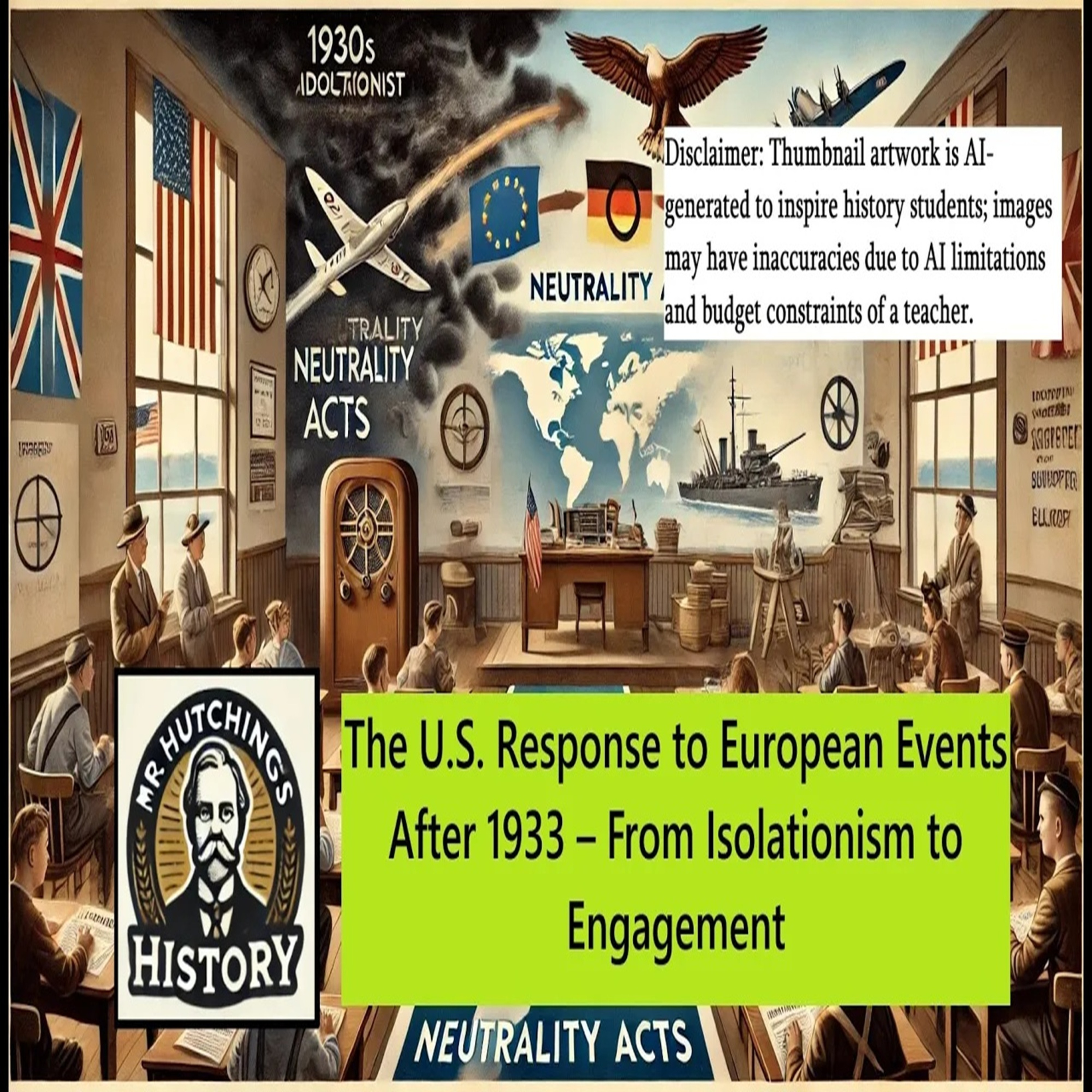 Mr. Hutchings HistoryThe U.S. Response to European Events After 1933 – From Isolationism to EngagementIn this episode of Mr. Hutchings History, we analyze the United States’ evolving response to European events from 1933 to 1941. Starting with the isolationist policies rooted in post-World War I disillusionment and the Great Depression, we explore how President Franklin D. Roosevelt navigated public opinion and legislative constraints to prepare the U.S. for its eventual involvement in World War II.
Key topics include the Neutrality Acts, the Quarantine Speech, the Munich Agreement, and the pivotal Lend-Lease Act of 1941, marking the transition from isolationism to international engagement. We also discuss the economic and geopolitical pressures that led to th...2024-11-1917 min
Mr. Hutchings HistoryThe U.S. Response to European Events After 1933 – From Isolationism to EngagementIn this episode of Mr. Hutchings History, we analyze the United States’ evolving response to European events from 1933 to 1941. Starting with the isolationist policies rooted in post-World War I disillusionment and the Great Depression, we explore how President Franklin D. Roosevelt navigated public opinion and legislative constraints to prepare the U.S. for its eventual involvement in World War II.
Key topics include the Neutrality Acts, the Quarantine Speech, the Munich Agreement, and the pivotal Lend-Lease Act of 1941, marking the transition from isolationism to international engagement. We also discuss the economic and geopolitical pressures that led to th...2024-11-1917 min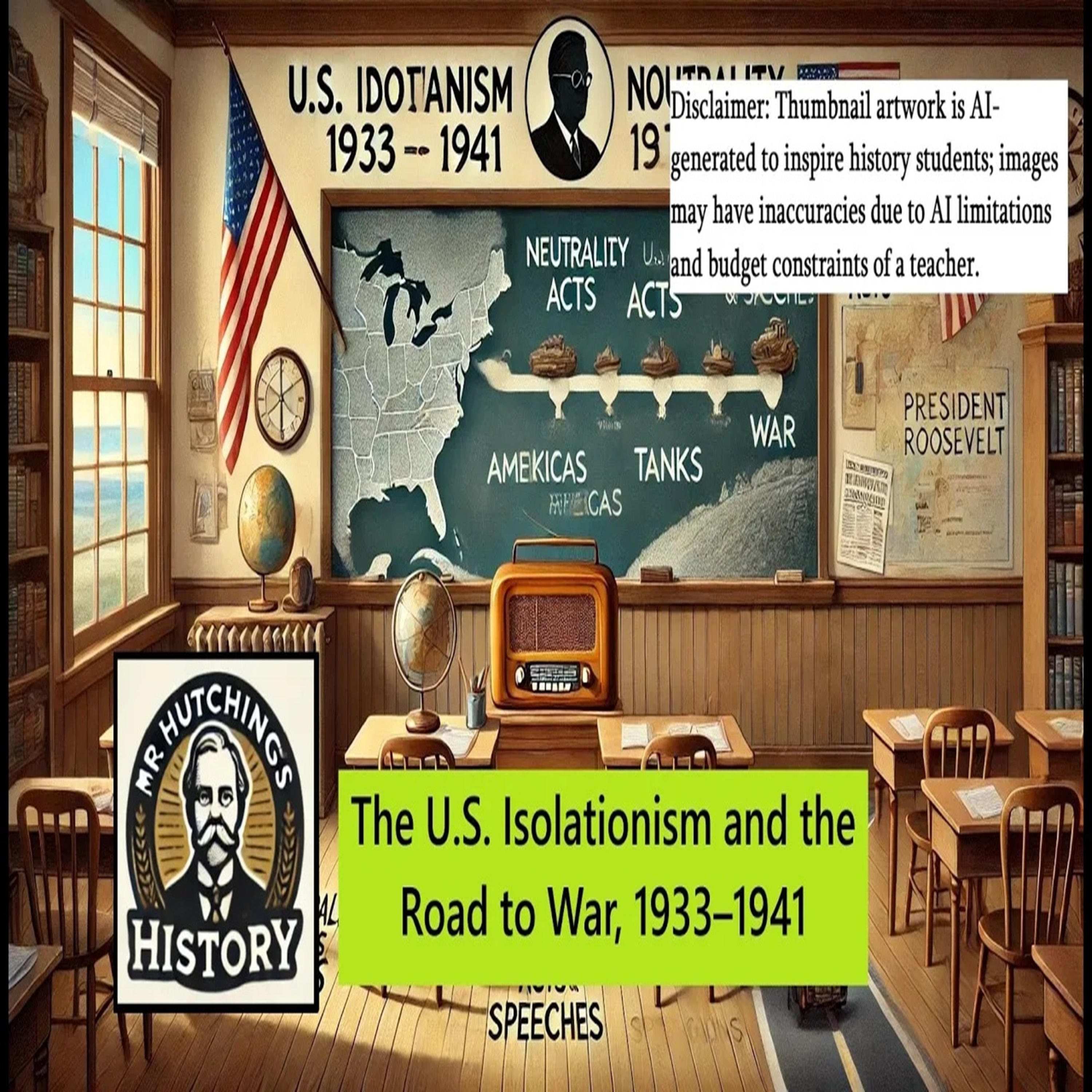 Mr. Hutchings HistoryThe U.S. Isolationism and the Road to War, 1933–1941In this episode of Mr. Hutchings History, we explore the evolution of U.S. foreign policy from staunch isolationism after World War I to gradual intervention as global tensions rose in the 1930s and 1940s. Starting with the roots of isolationism, including the Senate's rejection of the Treaty of Versailles and the Neutrality Acts, we analyze how President Franklin D. Roosevelt balanced public sentiment with the growing threats posed by Nazi Germany, Imperial Japan, and Fascist Italy.
Key topics include the Quarantine Speech, the Cash-and-Carry provision, and the Lend-Lease Act, signaling America’s shift toward supporting the Al...2024-11-1914 min
Mr. Hutchings HistoryThe U.S. Isolationism and the Road to War, 1933–1941In this episode of Mr. Hutchings History, we explore the evolution of U.S. foreign policy from staunch isolationism after World War I to gradual intervention as global tensions rose in the 1930s and 1940s. Starting with the roots of isolationism, including the Senate's rejection of the Treaty of Versailles and the Neutrality Acts, we analyze how President Franklin D. Roosevelt balanced public sentiment with the growing threats posed by Nazi Germany, Imperial Japan, and Fascist Italy.
Key topics include the Quarantine Speech, the Cash-and-Carry provision, and the Lend-Lease Act, signaling America’s shift toward supporting the Al...2024-11-1914 min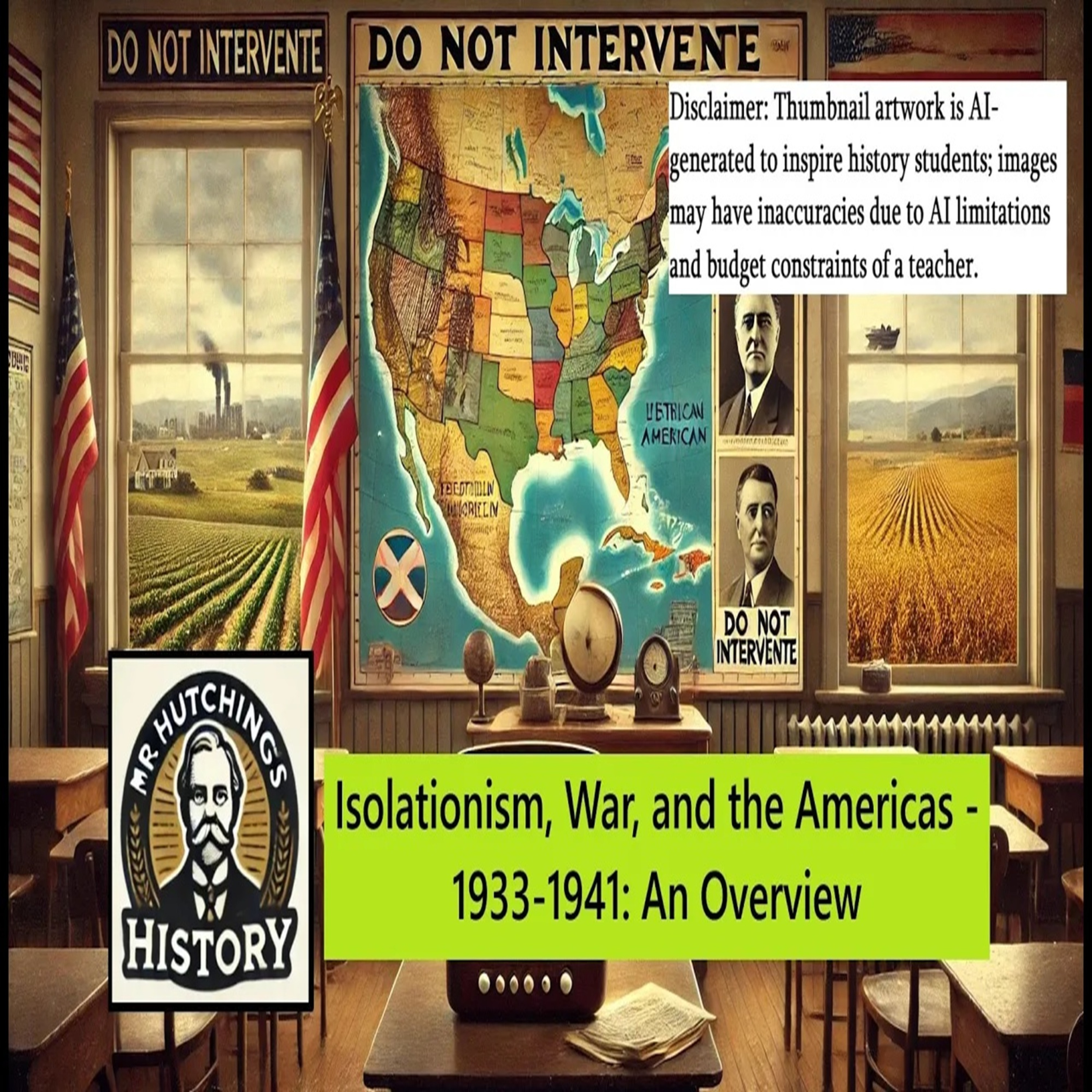 Mr. Hutchings HistoryIsolationism, War, and the Americas - 1933-1941: An OverviewIn this episode of Mr. Hutchings History, we analyze the responses of the United States and Canada to rising global tensions from 1933 to 1941. As fascism and Japanese imperialism grew, the U.S. adhered to isolationism through policies like the Neutrality Acts. However, events like the Munich Agreement and the Cash-and-Carry provision signaled a gradual shift under Roosevelt’s leadership, culminating in the Lend-Lease Act.
In Asia, Japan’s expansion and the U.S. oil embargo heightened tensions, leading to the attack on Pearl Harbor and the end of U.S. neutrality. Meanwhile, Canada, closely tied to Britain, decl...2024-11-1920 min
Mr. Hutchings HistoryIsolationism, War, and the Americas - 1933-1941: An OverviewIn this episode of Mr. Hutchings History, we analyze the responses of the United States and Canada to rising global tensions from 1933 to 1941. As fascism and Japanese imperialism grew, the U.S. adhered to isolationism through policies like the Neutrality Acts. However, events like the Munich Agreement and the Cash-and-Carry provision signaled a gradual shift under Roosevelt’s leadership, culminating in the Lend-Lease Act.
In Asia, Japan’s expansion and the U.S. oil embargo heightened tensions, leading to the attack on Pearl Harbor and the end of U.S. neutrality. Meanwhile, Canada, closely tied to Britain, decl...2024-11-1920 min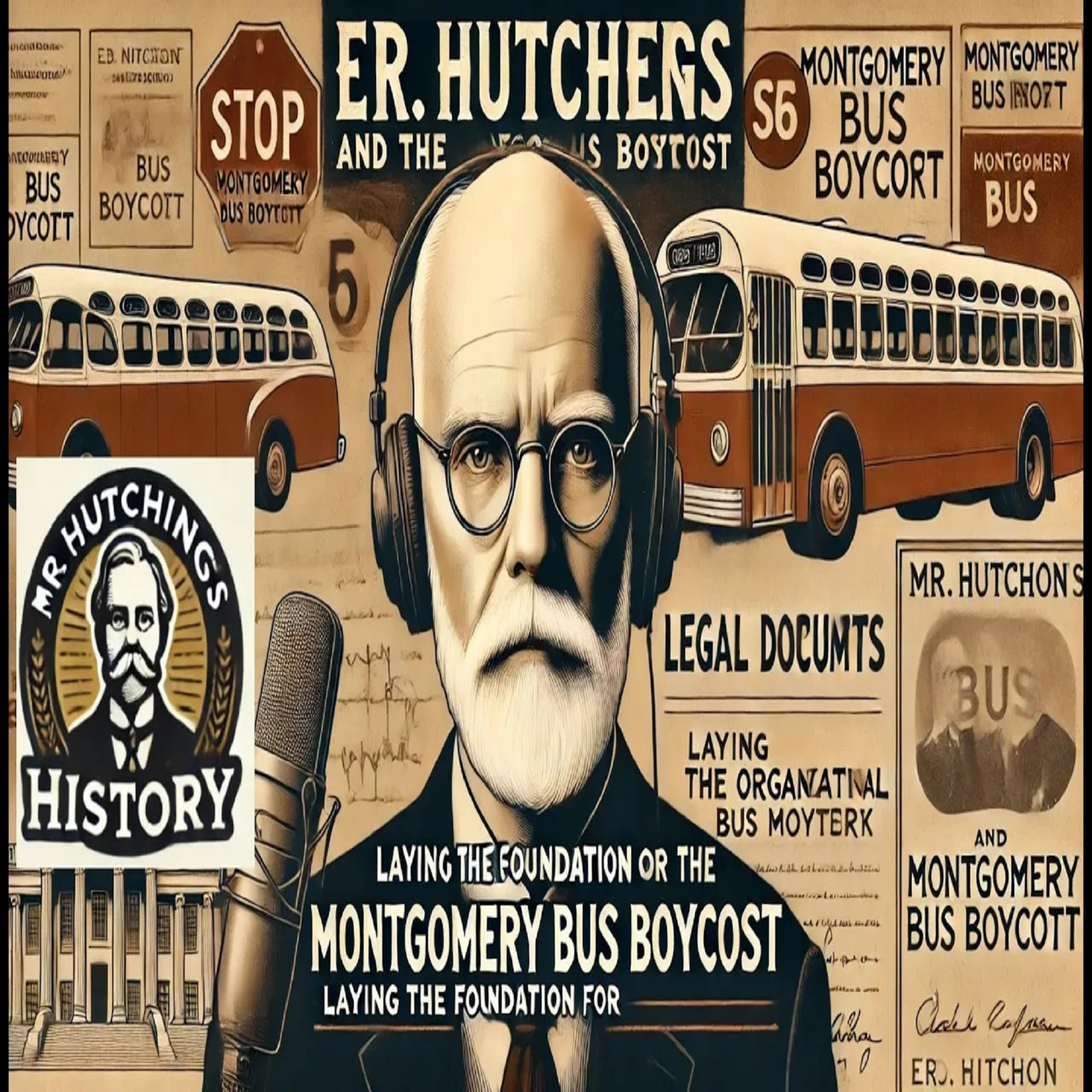 Mr. Hutchings HistoryE.D. Nixon and the Foundation of the Montgomery Bus BoycottIn this episode of Mr. Hutchings History, we spotlight E.D. Nixon, the unsung hero of the Montgomery Bus Boycott. Discover how Nixon’s leadership, from his early voting rights advocacy to organizing Rosa Parks’ pivotal stand against bus segregation, set the stage for the Civil Rights Movement. Learn how his collaboration with Martin Luther King Jr. and other activists sustained the 381-day boycott, leading to the landmark Browder v. Gayle decision that ended bus segregation.
#IBHistory #CivilRightsMovement #EDNixon #MontgomeryBusBoycott #RosaParks #BrowdervGayle #MartinLutherKingJr #VotingRights #HistoryPodcast #RightsAndProtest #1950sAmerica #IBDP #MrHutchingsHistory
Works Cited
Branch, Taylor. Part...2024-11-1812 min
Mr. Hutchings HistoryE.D. Nixon and the Foundation of the Montgomery Bus BoycottIn this episode of Mr. Hutchings History, we spotlight E.D. Nixon, the unsung hero of the Montgomery Bus Boycott. Discover how Nixon’s leadership, from his early voting rights advocacy to organizing Rosa Parks’ pivotal stand against bus segregation, set the stage for the Civil Rights Movement. Learn how his collaboration with Martin Luther King Jr. and other activists sustained the 381-day boycott, leading to the landmark Browder v. Gayle decision that ended bus segregation.
#IBHistory #CivilRightsMovement #EDNixon #MontgomeryBusBoycott #RosaParks #BrowdervGayle #MartinLutherKingJr #VotingRights #HistoryPodcast #RightsAndProtest #1950sAmerica #IBDP #MrHutchingsHistory
Works Cited
Branch, Taylor. Part...2024-11-1812 min Grammar Girl Quick and Dirty Tips for Better WritingHow to become a supercommunicator, with Charles Duhigg978. Join Pulitzer Prize-winning journalist and bestselling author, Charles Duhigg, as we talk about mastering the art of communication and his new book, "Supercommunicators." We explore the skills anyone (yes, you!) can learn to become a powerful communicator. Learn about the science behind effective communication, from NASA's emotional intelligence tests for astronauts to everyday interactions that can make or break relationships. Learn about the art of asking the right questions, the importance of matching conversational styles, and the profound impact of understanding and being understood. Whether you're negotiating a business deal, strengthening personal relationships, or navigating the complexities of online...2024-04-1819 min
Grammar Girl Quick and Dirty Tips for Better WritingHow to become a supercommunicator, with Charles Duhigg978. Join Pulitzer Prize-winning journalist and bestselling author, Charles Duhigg, as we talk about mastering the art of communication and his new book, "Supercommunicators." We explore the skills anyone (yes, you!) can learn to become a powerful communicator. Learn about the science behind effective communication, from NASA's emotional intelligence tests for astronauts to everyday interactions that can make or break relationships. Learn about the art of asking the right questions, the importance of matching conversational styles, and the profound impact of understanding and being understood. Whether you're negotiating a business deal, strengthening personal relationships, or navigating the complexities of online...2024-04-1819 min Via JazzShabaka Hutchings presenta "Perceive its beauty, acknowledge its grace"Música que sona al programa:
"End of innocence" (de l'àlbum "Perceive its beauty, acknowledge its grace", 2024)
Shabaka Hutchings, clarinet, flautes, saxo tenor; Jason Moran, piano; Nasheet Waits, bateria; Carlos Niño, percussions.
"As the planets and the stars collapse" i "Insecurities"
Shabaka Hutchings, shakuhachi; Brandee Younger i Charles Overton, arpes; Moses Sumney, veu; Miguel Atwood-Ferguson, violí.
"Envision yourself levitating", "In remembrance of those fallen", "Throughout The Madness, Stay Strong" i "To never forget the source" (de l'àlbum "Black to the future", 2021)
Shabaka Hutchings, saxo i vents; Theon Cross, tuba; Edward Wakili-Hick i Tom Skinner, percussions; Steve Williamson, saxo...2024-04-0856 min
Via JazzShabaka Hutchings presenta "Perceive its beauty, acknowledge its grace"Música que sona al programa:
"End of innocence" (de l'àlbum "Perceive its beauty, acknowledge its grace", 2024)
Shabaka Hutchings, clarinet, flautes, saxo tenor; Jason Moran, piano; Nasheet Waits, bateria; Carlos Niño, percussions.
"As the planets and the stars collapse" i "Insecurities"
Shabaka Hutchings, shakuhachi; Brandee Younger i Charles Overton, arpes; Moses Sumney, veu; Miguel Atwood-Ferguson, violí.
"Envision yourself levitating", "In remembrance of those fallen", "Throughout The Madness, Stay Strong" i "To never forget the source" (de l'àlbum "Black to the future", 2021)
Shabaka Hutchings, saxo i vents; Theon Cross, tuba; Edward Wakili-Hick i Tom Skinner, percussions; Steve Williamson, saxo...2024-04-0856 min Podcast Very ImportantWW - FiddlesticksSeason 2 is being pushed back. Sue me. This week we've got a very spooky Writers' Wroom, just out of time for Halloween! Connor and Jack read a Woody Harelson horror vehicle about a murderous meat puppet, and a faithful adaptation of the videogame Pokemon to the big screen.Production and music by Connor DoyleTheme by Charles Hutchings Hosted on Acast. See acast.com/privacy for more information.2021-11-0336 min
Podcast Very ImportantWW - FiddlesticksSeason 2 is being pushed back. Sue me. This week we've got a very spooky Writers' Wroom, just out of time for Halloween! Connor and Jack read a Woody Harelson horror vehicle about a murderous meat puppet, and a faithful adaptation of the videogame Pokemon to the big screen.Production and music by Connor DoyleTheme by Charles Hutchings Hosted on Acast. See acast.com/privacy for more information.2021-11-0336 min Podcast Very ImportantWW - Jack is Back (From Hell)The Writers Wroom is back and so is Jack! (he went to hell at the end of the last one). We read scripts and leap into the theatre of the mindscape. Hosted on Acast. See acast.com/privacy for more information.2021-09-0831 min
Podcast Very ImportantWW - Jack is Back (From Hell)The Writers Wroom is back and so is Jack! (he went to hell at the end of the last one). We read scripts and leap into the theatre of the mindscape. Hosted on Acast. See acast.com/privacy for more information.2021-09-0831 min Podcast Very ImportantPVI Episode 26 - That Concludes the Dog Bell Hosted on Acast. See acast.com/privacy for more information.2021-09-0159 min
Podcast Very ImportantPVI Episode 26 - That Concludes the Dog Bell Hosted on Acast. See acast.com/privacy for more information.2021-09-0159 min Podcast Very ImportantPVI Episode 25 - Speak Up, I'm Inside This Man Hosted on Acast. See acast.com/privacy for more information.2021-08-251h 04
Podcast Very ImportantPVI Episode 25 - Speak Up, I'm Inside This Man Hosted on Acast. See acast.com/privacy for more information.2021-08-251h 04 Podcast Very ImportantWW - Jack Goes to HellJack Piss and Dick Prickles welcome you to The Writers' Wroom, where they workshop their exciting Hollywood scripts! This week's guest is no other than famous cigarette and pony tycoon Duke Puke!This week's scripts: Donny Kungo, Adventures with Duke Puke, and The Wizard of HBO's OzSexy Music: https://www.bensound.com Hosted on Acast. See acast.com/privacy for more information.2021-08-1828 min
Podcast Very ImportantWW - Jack Goes to HellJack Piss and Dick Prickles welcome you to The Writers' Wroom, where they workshop their exciting Hollywood scripts! This week's guest is no other than famous cigarette and pony tycoon Duke Puke!This week's scripts: Donny Kungo, Adventures with Duke Puke, and The Wizard of HBO's OzSexy Music: https://www.bensound.com Hosted on Acast. See acast.com/privacy for more information.2021-08-1828 min Podcast Very ImportantPVI Episode 24 - Cornsmut Hosted on Acast. See acast.com/privacy for more information.2021-08-1156 min
Podcast Very ImportantPVI Episode 24 - Cornsmut Hosted on Acast. See acast.com/privacy for more information.2021-08-1156 min Podcast Very ImportantPVI Episode 23 - Blue Man Goop Hosted on Acast. See acast.com/privacy for more information.2021-08-041h 05
Podcast Very ImportantPVI Episode 23 - Blue Man Goop Hosted on Acast. See acast.com/privacy for more information.2021-08-041h 05 Podcast Very ImportantPVI Episode 22 - Funny AND True Hosted on Acast. See acast.com/privacy for more information.2021-07-2852 min
Podcast Very ImportantPVI Episode 22 - Funny AND True Hosted on Acast. See acast.com/privacy for more information.2021-07-2852 min Podcast Very ImportantPVI Episode 21 - Naughty GermanyThis week the boys dispense with the freaking pleasantries and just get straight down to it, okay?They talk about corn, the Rule of 10:30, David Lynch making children cry, and the Connorputer 1000! Hosted on Acast. See acast.com/privacy for more information.2021-07-2147 min
Podcast Very ImportantPVI Episode 21 - Naughty GermanyThis week the boys dispense with the freaking pleasantries and just get straight down to it, okay?They talk about corn, the Rule of 10:30, David Lynch making children cry, and the Connorputer 1000! Hosted on Acast. See acast.com/privacy for more information.2021-07-2147 min Podcast Very ImportantPVI Episode 20 - Tiny Capri SunsThe guys welcome Terry the Super-Spreader from Barrie, talk about Shane's GERD, and Connor tries the new tiny Capri Suns that Burger King gave him.Check out @tommyHmarshall and @prestige.television! Hosted on Acast. See acast.com/privacy for more information.2021-07-141h 05
Podcast Very ImportantPVI Episode 20 - Tiny Capri SunsThe guys welcome Terry the Super-Spreader from Barrie, talk about Shane's GERD, and Connor tries the new tiny Capri Suns that Burger King gave him.Check out @tommyHmarshall and @prestige.television! Hosted on Acast. See acast.com/privacy for more information.2021-07-141h 05 Podcast Very ImportantPVI Episode 19 - Don't Never Betray a Baby Hosted on Acast. See acast.com/privacy for more information.2021-07-071h 08
Podcast Very ImportantPVI Episode 19 - Don't Never Betray a Baby Hosted on Acast. See acast.com/privacy for more information.2021-07-071h 08 Podcast Very ImportantPVI Episode 18 - Open Vault Special #1 Hosted on Acast. See acast.com/privacy for more information.2021-06-3042 min
Podcast Very ImportantPVI Episode 18 - Open Vault Special #1 Hosted on Acast. See acast.com/privacy for more information.2021-06-3042 min Podcast Very ImportantPVI Episode 17 - Vatican 3: Tokyo Drift Hosted on Acast. See acast.com/privacy for more information.2021-06-231h 10
Podcast Very ImportantPVI Episode 17 - Vatican 3: Tokyo Drift Hosted on Acast. See acast.com/privacy for more information.2021-06-231h 10 Podcast Very ImportantPVI Episode 16 - Don't F with the Hard TThis week we're celebrating straight pride month with Alanis Percocet and Merlola Bordeaux from Citiville, a town for drag queens, and by drag queens! Listen to Lola and Lani wherever you get podcasts!https://podcasts.apple.com/ca/podcast/lola-and-lani/id1520780763 Hosted on Acast. See acast.com/privacy for more information.2021-06-161h 09
Podcast Very ImportantPVI Episode 16 - Don't F with the Hard TThis week we're celebrating straight pride month with Alanis Percocet and Merlola Bordeaux from Citiville, a town for drag queens, and by drag queens! Listen to Lola and Lani wherever you get podcasts!https://podcasts.apple.com/ca/podcast/lola-and-lani/id1520780763 Hosted on Acast. See acast.com/privacy for more information.2021-06-161h 09 Podcast Very ImportantPVI Episode 15 - Scottman John Hosted on Acast. See acast.com/privacy for more information.2021-06-091h 07
Podcast Very ImportantPVI Episode 15 - Scottman John Hosted on Acast. See acast.com/privacy for more information.2021-06-091h 07 Podcast Very ImportantPVI Episode 14 - Penis the Meanis Hosted on Acast. See acast.com/privacy for more information.2021-06-021h 02
Podcast Very ImportantPVI Episode 14 - Penis the Meanis Hosted on Acast. See acast.com/privacy for more information.2021-06-021h 02 Podcast Very ImportantPVI Episode 13 - How to Go Insane Hosted on Acast. See acast.com/privacy for more information.2021-05-261h 06
Podcast Very ImportantPVI Episode 13 - How to Go Insane Hosted on Acast. See acast.com/privacy for more information.2021-05-261h 06 Podcast Very ImportantPVI Episode 12 - Stuart BIG Hosted on Acast. See acast.com/privacy for more information.2021-05-1958 min
Podcast Very ImportantPVI Episode 12 - Stuart BIG Hosted on Acast. See acast.com/privacy for more information.2021-05-1958 min Podcast Very ImportantPVI Episode 11 - Connie Neville Hosted on Acast. See acast.com/privacy for more information.2021-04-1454 min
Podcast Very ImportantPVI Episode 11 - Connie Neville Hosted on Acast. See acast.com/privacy for more information.2021-04-1454 min Mondo JazzStephanie Nilles, Julian Lage, Charles Mingus, Sons of Kemet & More New ReleasesOur exploration of new and upcoming releases, and reissues, continues with the compelling homage to Charles Mingus by Stephanie Nilles, followed by the stunning Bremen live recordings recently released by Sunnyside Records. Sandwhiched between two beautiful Blue Note albums (the upcoming project by the Julian Lage Trio and an instant classic by Charles Lloyd) and two projects by the beacons of the London scene, Shabaka Hutchings and Nubya Garcia, the usual mix of European projects (Bad Uok, Florian Arbenz and Edward Perraud, and blast from the downtown past: the debut album by Pachora!The playlist features Julian...2021-04-091h 17
Mondo JazzStephanie Nilles, Julian Lage, Charles Mingus, Sons of Kemet & More New ReleasesOur exploration of new and upcoming releases, and reissues, continues with the compelling homage to Charles Mingus by Stephanie Nilles, followed by the stunning Bremen live recordings recently released by Sunnyside Records. Sandwhiched between two beautiful Blue Note albums (the upcoming project by the Julian Lage Trio and an instant classic by Charles Lloyd) and two projects by the beacons of the London scene, Shabaka Hutchings and Nubya Garcia, the usual mix of European projects (Bad Uok, Florian Arbenz and Edward Perraud, and blast from the downtown past: the debut album by Pachora!The playlist features Julian...2021-04-091h 17 Podcast Very ImportantPVI Episode 10 - Boyscout Cookies Hosted on Acast. See acast.com/privacy for more information.2021-04-071h 10
Podcast Very ImportantPVI Episode 10 - Boyscout Cookies Hosted on Acast. See acast.com/privacy for more information.2021-04-071h 10 Podcast Very ImportantPVI Episode 9 - Tiny Man in a Huge ChairConnor and Shane are joined by a very small man named Bingo Solomon (Charles Hutchings).VIV = Crud Star Hosted on Acast. See acast.com/privacy for more information.2021-03-311h 05
Podcast Very ImportantPVI Episode 9 - Tiny Man in a Huge ChairConnor and Shane are joined by a very small man named Bingo Solomon (Charles Hutchings).VIV = Crud Star Hosted on Acast. See acast.com/privacy for more information.2021-03-311h 05 Podcast Very ImportantPVI Episode 8 - Hair for Teeth or Teeth for Hair?Connor changes the entire format of the show and Shane hates it. Connor's cousin's boyfriend Zeke from Spaghetti Squad shows up and Connor hates it.VIV = No Problem, Houston Hosted on Acast. See acast.com/privacy for more information.2021-03-241h 01
Podcast Very ImportantPVI Episode 8 - Hair for Teeth or Teeth for Hair?Connor changes the entire format of the show and Shane hates it. Connor's cousin's boyfriend Zeke from Spaghetti Squad shows up and Connor hates it.VIV = No Problem, Houston Hosted on Acast. See acast.com/privacy for more information.2021-03-241h 01 Podcast Very ImportantPVI Episode 7 - SWORD CHECK!Hope you got your swords!VIV = Margaret's Taxi Service: Women Hosted on Acast. See acast.com/privacy for more information.2021-03-171h 06
Podcast Very ImportantPVI Episode 7 - SWORD CHECK!Hope you got your swords!VIV = Margaret's Taxi Service: Women Hosted on Acast. See acast.com/privacy for more information.2021-03-171h 06 Podcast Very ImportantPVI Episode 6 - War Music: Hampster DanceBE PREPARED! That's the theme of this episode!VIV: Cheryl Crook - Celma Hyuk Hosted on Acast. See acast.com/privacy for more information.2021-03-1052 min
Podcast Very ImportantPVI Episode 6 - War Music: Hampster DanceBE PREPARED! That's the theme of this episode!VIV: Cheryl Crook - Celma Hyuk Hosted on Acast. See acast.com/privacy for more information.2021-03-1052 min Podcast Very ImportantPVI Episode 5 - Don't Smoke Weed with Mike TysonTito Fazuli joins us and we can't even figure out why!VIV: Cheryl Crook - Bigfan Longfan Hosted on Acast. See acast.com/privacy for more information.2021-03-031h 10
Podcast Very ImportantPVI Episode 5 - Don't Smoke Weed with Mike TysonTito Fazuli joins us and we can't even figure out why!VIV: Cheryl Crook - Bigfan Longfan Hosted on Acast. See acast.com/privacy for more information.2021-03-031h 10 Podcast Very ImportantPVI Episode 4 - Hentai Mona Lisa Hosted on Acast. See acast.com/privacy for more information.2021-02-2459 min
Podcast Very ImportantPVI Episode 4 - Hentai Mona Lisa Hosted on Acast. See acast.com/privacy for more information.2021-02-2459 min Podcast Very ImportantPVI Episode 3 - Don't Think Like The Joker Hosted on Acast. See acast.com/privacy for more information.2021-02-1756 min
Podcast Very ImportantPVI Episode 3 - Don't Think Like The Joker Hosted on Acast. See acast.com/privacy for more information.2021-02-1756 min Podcast Very ImportantPVI Episode 2 - CouldbeefThis week we welcome Jack Piss from the Writers' Wroom podcast! Jack is unique in that he has devout, uniformed politics that he terms "bad politics". We also introduce a new meat alternative and Connor talks about his wide urethra.The Very Important Vault opens again and with 1-800-NUMBERS edited by Jason Crevier Hosted on Acast. See acast.com/privacy for more information.2021-02-101h 02
Podcast Very ImportantPVI Episode 2 - CouldbeefThis week we welcome Jack Piss from the Writers' Wroom podcast! Jack is unique in that he has devout, uniformed politics that he terms "bad politics". We also introduce a new meat alternative and Connor talks about his wide urethra.The Very Important Vault opens again and with 1-800-NUMBERS edited by Jason Crevier Hosted on Acast. See acast.com/privacy for more information.2021-02-101h 02 Podcast Very ImportantPVI Episode 1 - Wings are Weapons, Wieners are Wonders Hosted on Acast. See acast.com/privacy for more information.2021-01-311h 02
Podcast Very ImportantPVI Episode 1 - Wings are Weapons, Wieners are Wonders Hosted on Acast. See acast.com/privacy for more information.2021-01-311h 02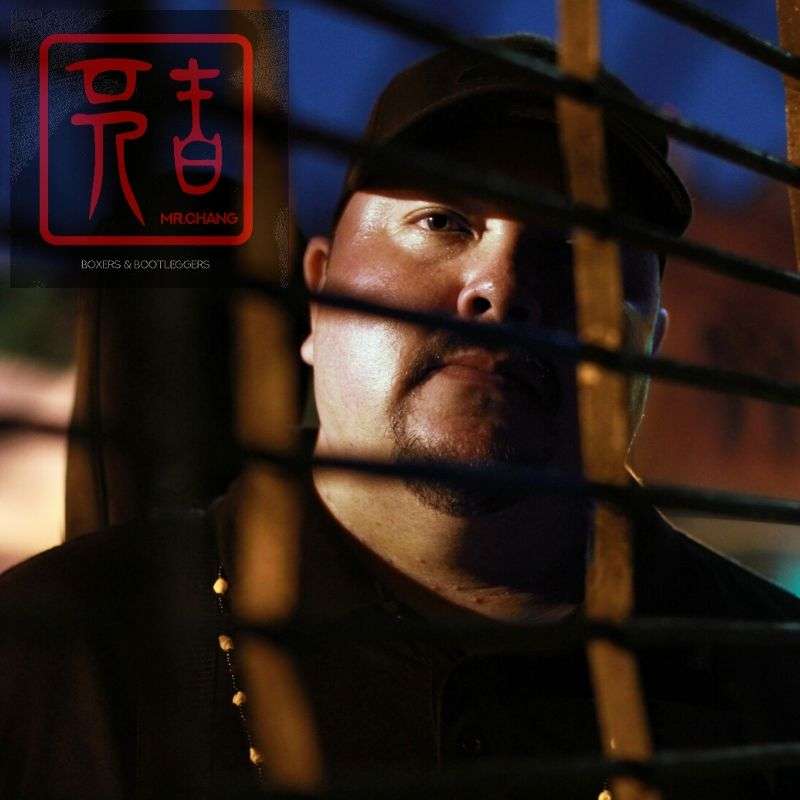 Foxes and HedgehogsKevin Chang AKA Mr. Chang discusses his latest album “Boxers and Bootleggers”.Episode Notes
Send us your feedback here-->F&HFEEDBACK
Kevin Chang AKA Mr. Chang discusses his new album “Boxers and Bootleggers”, musical influences, life as a musician in Hawaii, and Hawaii’s connection to Idaho Spud candy bars.
Kevin Chang AKA Mr. Chang discusses his new album “Boxers and Bootleggers”, musical influences, life as a musician in Hawaii, and Hawaii’s connection to Idaho Spud candy bars.
Kevin Chang is an attorney, film producer, singer-songwriter & Co-Director of a Hawaiʻi non-profit organization Kua‘āina Ulu ‘Auamo (KUA: kuahawaii.org ). Formerly a solo practitioner in th...2020-03-271h 03
Foxes and HedgehogsKevin Chang AKA Mr. Chang discusses his latest album “Boxers and Bootleggers”.Episode Notes
Send us your feedback here-->F&HFEEDBACK
Kevin Chang AKA Mr. Chang discusses his new album “Boxers and Bootleggers”, musical influences, life as a musician in Hawaii, and Hawaii’s connection to Idaho Spud candy bars.
Kevin Chang AKA Mr. Chang discusses his new album “Boxers and Bootleggers”, musical influences, life as a musician in Hawaii, and Hawaii’s connection to Idaho Spud candy bars.
Kevin Chang is an attorney, film producer, singer-songwriter & Co-Director of a Hawaiʻi non-profit organization Kua‘āina Ulu ‘Auamo (KUA: kuahawaii.org ). Formerly a solo practitioner in th...2020-03-271h 03 Carolyn Talks..., PodcastCarolyn Talks...with Roney Director of Glitter's Wild WomenOn this episode Carolyn sits down and talks with Roney director of Glitter's Wild Women. The film comedy-drama that focuses two sisters, Hannah and Sophie, living in solitude on their eighty acres of farmland. The sisters experience a supernatural life when they harvest and smoke glitter that gives them super strength.Roney is an emerging filmmaker with an interesting education. She originally moved to Toronto in 2010 to play for the Ryerson Women’s Basketball team. Shortly after her first season, she retired from basketball and began taking classes at Second City. She was accepted into th...2018-09-1321 min
Carolyn Talks..., PodcastCarolyn Talks...with Roney Director of Glitter's Wild WomenOn this episode Carolyn sits down and talks with Roney director of Glitter's Wild Women. The film comedy-drama that focuses two sisters, Hannah and Sophie, living in solitude on their eighty acres of farmland. The sisters experience a supernatural life when they harvest and smoke glitter that gives them super strength.Roney is an emerging filmmaker with an interesting education. She originally moved to Toronto in 2010 to play for the Ryerson Women’s Basketball team. Shortly after her first season, she retired from basketball and began taking classes at Second City. She was accepted into th...2018-09-1321 min Foxes and HedgehogsCollette Mclafferty: "Confessions of a Bad, Ugly Singer"Episode Notes
Collette McLafferty Podcast:
Interview with First time author, lawsuit reform activist, musician. Collette McLafferty lived through an unbelievable, yet true, experience and Confessions of a Bad, Ugly Singer is her account of that time. She is a professional musician, and at the time of this experience she was working as a session singer and singing in several tribute bands. but then in 2011, she was hired to sing at one gig in New York in a new P!nk cover band. She was paid $75 for the appearance. Shockingly, a short time later she found...2018-09-061h 10
Foxes and HedgehogsCollette Mclafferty: "Confessions of a Bad, Ugly Singer"Episode Notes
Collette McLafferty Podcast:
Interview with First time author, lawsuit reform activist, musician. Collette McLafferty lived through an unbelievable, yet true, experience and Confessions of a Bad, Ugly Singer is her account of that time. She is a professional musician, and at the time of this experience she was working as a session singer and singing in several tribute bands. but then in 2011, she was hired to sing at one gig in New York in a new P!nk cover band. She was paid $75 for the appearance. Shockingly, a short time later she found...2018-09-061h 10 Think And Grow Rich Global Mastermind InitiativeThe Secret Substance Of CreationA few weeks ago at our annual family
reunion, my 9 year old son, Kayden,
and I memorized a quote together.
I believe this quote is POWERFUL.
Here it is .
"The things of the world are fluid, to a power
within man, by which he rules them."
-Charles F Haanel
Do you believe that's true [[firstname]]?
This morning, on our Think And Grow Rich
Mastermind call - we talked about how that
just might be true,
... and FURTHER more...
Mr. Wallace D Wattles, taught us some steps for
making more of the things we want POUR into
our lives.
Please enjoy...2015-07-291h 04
Think And Grow Rich Global Mastermind InitiativeThe Secret Substance Of CreationA few weeks ago at our annual family
reunion, my 9 year old son, Kayden,
and I memorized a quote together.
I believe this quote is POWERFUL.
Here it is .
"The things of the world are fluid, to a power
within man, by which he rules them."
-Charles F Haanel
Do you believe that's true [[firstname]]?
This morning, on our Think And Grow Rich
Mastermind call - we talked about how that
just might be true,
... and FURTHER more...
Mr. Wallace D Wattles, taught us some steps for
making more of the things we want POUR into
our lives.
Please enjoy...2015-07-291h 04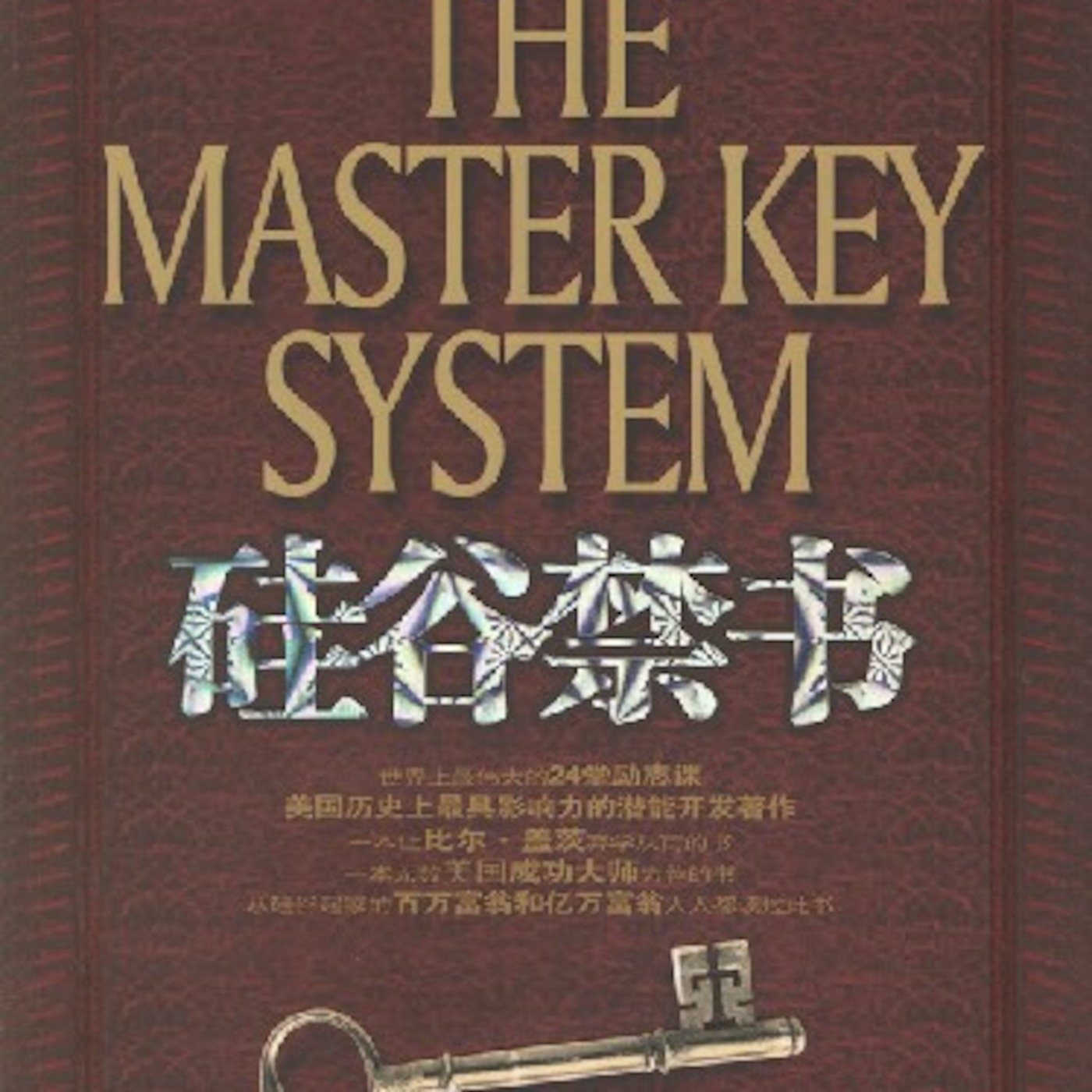 Think And Grow Rich Global Mastermind InitiativeThe Master Key System - Chapter 8In today's Episode of the Think And Grow Rich Global Mastermind, we delve into chapter 8 of The Master Key System By Charles F Haanel.
As you listen to today's podcast, It's possible to discover something new that can allow you to be even more powerful in your life and business.
Enjoy!2014-05-1939 min
Think And Grow Rich Global Mastermind InitiativeThe Master Key System - Chapter 8In today's Episode of the Think And Grow Rich Global Mastermind, we delve into chapter 8 of The Master Key System By Charles F Haanel.
As you listen to today's podcast, It's possible to discover something new that can allow you to be even more powerful in your life and business.
Enjoy!2014-05-1939 min